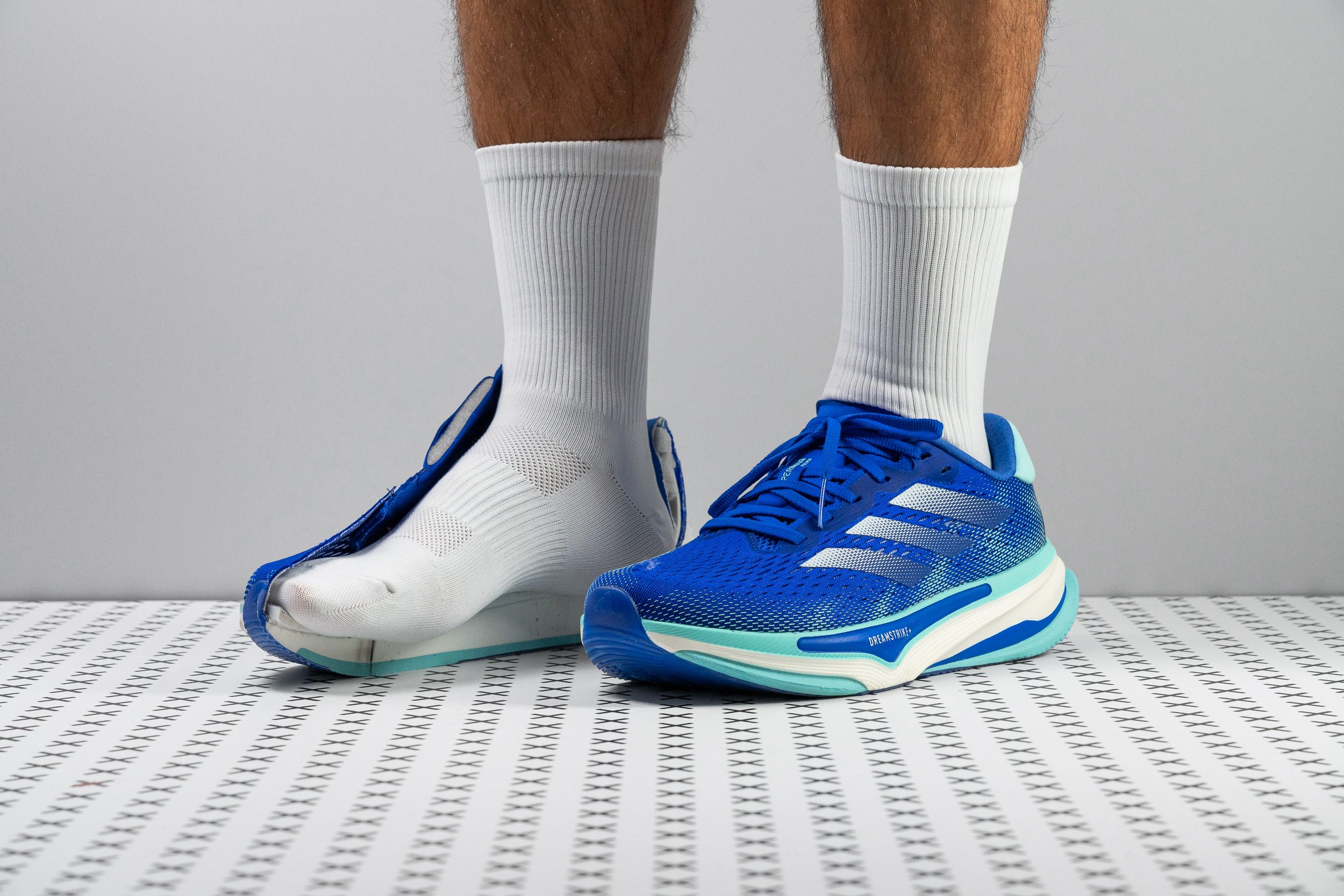Our verdict
Pros
- Enhanced midsole
- Fantastic stability
- Ideal for long-distance training
- All-day comfort
- Great choice for heel strikers
- Generous, roomy upper
- Reasonable weight
- Well-ventilated upper
Cons
- Durability concerns
- Not for narrow feet
Audience verdict
- Top 25% in road running shoes
- Top 25% in neutral running shoes
Comparison
The most similar running shoes compared
+ + Add a shoe | |||||
|---|---|---|---|---|---|
| Audience score | 89 Great! | 89 Great! | 93 Superb! | 90 Superb! | |
| Price | $160 | $160 | $150 | $180 | |
| Pace | Daily running | Daily running | Daily runningTempo | Daily running | |
| Shock absorption | Moderate | High | High | Moderate | |
| Energy return | High | Moderate | High | High | |
| Traction | Moderate | High | Moderate | High | |
| Arch support | Neutral | Neutral | Neutral | Neutral | |
| Weight lab Weight brand | 9.9 oz / 281g 10 oz / 284g | 9.9 oz / 282g 10 oz / 283g | 7.9 oz / 223g 7.9 oz / 224g | 10.3 oz / 292g 11.4 oz / 323g | |
| Lightweight | ✗ | ✗ | ✓ | ✗ | |
| Drop lab Drop brand | 8.9 mm 8.0 mm | 8.7 mm 5.0 mm | 8.0 mm 6.5 mm | 10.6 mm 10.0 mm | |
| Strike pattern | HeelMid/forefoot | HeelMid/forefoot | HeelMid/forefoot | Heel | |
| Size | True to size | True to size | True to size | True to size | |
| Midsole softness | Balanced | Soft | Balanced | Soft | |
| Difference in midsole softness in cold | Small | Normal | Small | Small | |
| Toebox durability | Decent | Decent | Bad | Decent | |
| Heel padding durability | Bad | Good | Good | Good | |
| Outsole durability | Bad | Good | Good | Good | |
| Breathability | Moderate | Breathable | Breathable | Breathable | |
| Width / fit | Medium | Medium | Medium | Wide | |
| Toebox width | Medium | Narrow | Medium | Wide | |
| Stiffness | Moderate | Stiff | Flexible | Stiff | |
| Torsional rigidity | Stiff | Stiff | Stiff | Stiff | |
| Heel counter stiffness | Stiff | Stiff | Moderate | Moderate | |
| Rocker | ✓ | ✗ | ✓ | ✗ | |
| Heel lab Heel brand | 36.1 mm 37.0 mm | 39.3 mm 39.0 mm | 36.1 mm 38.5 mm | 35.2 mm 39.0 mm | |
| Forefoot lab Forefoot brand | 27.2 mm 29.0 mm | 30.6 mm 34.0 mm | 28.1 mm 32.0 mm | 24.6 mm 29.0 mm | |
| Widths available | Normal | NormalWide | NormalWide | Normal | |
| Orthotic friendly | ✓ | ✓ | ✓ | ✓ | |
| Season | All seasons | SummerAll seasons | SummerAll seasons | SummerAll seasons | |
| Removable insole | ✓ | ✓ | ✓ | ✓ | |
| Ranking | #91 Top 24% | #119 Top 31% | #3 Top 1% | #51 Top 14% | |
| Popularity | #233 Bottom 39% | #93 Top 25% | #12 Top 4% | #200 Bottom 48% |
Who should buy
We believe the Supernova Prima from Adidas is an excellent choice for:
- Adidas devotees who’ve been waiting for a well-cushioned, dynamic daily trainer from the German brand.
- Runners seeking a durable workhorse for aerobic runs across any distance, with enough cushioning and all-day comfort.
- Heel strikers who want a shoe that naturally centers each stride but prefer to avoid those clunky stability shoes.
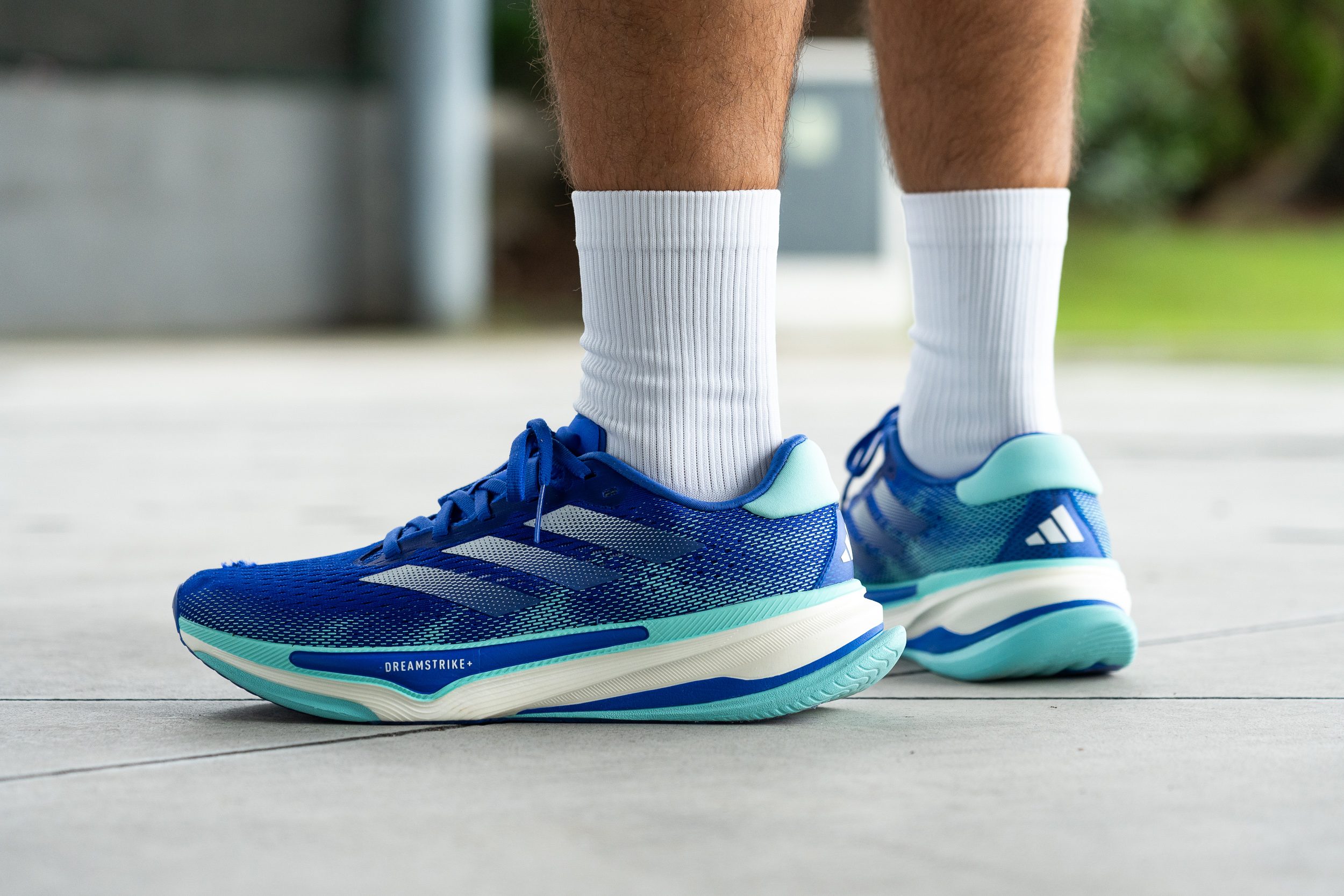
Who should NOT buy
The Supernova Prima raises some concerns, particularly in durability. In our lab tests, we found the build quality lacking compared to other tank-like cushioned trainers—models like the ASICS GT 2000 13 and Brooks Ghost Max show significantly better outsole resilience.
Additionally, we think those with narrow feet may find the Prima overly spacious, leading to discomfort during runs. Since narrow sizes aren't offered, we suggest opting for a less roomy daily trainer like the Hoka Skyflow or Nike Pegasus Plus for a more secure fit.
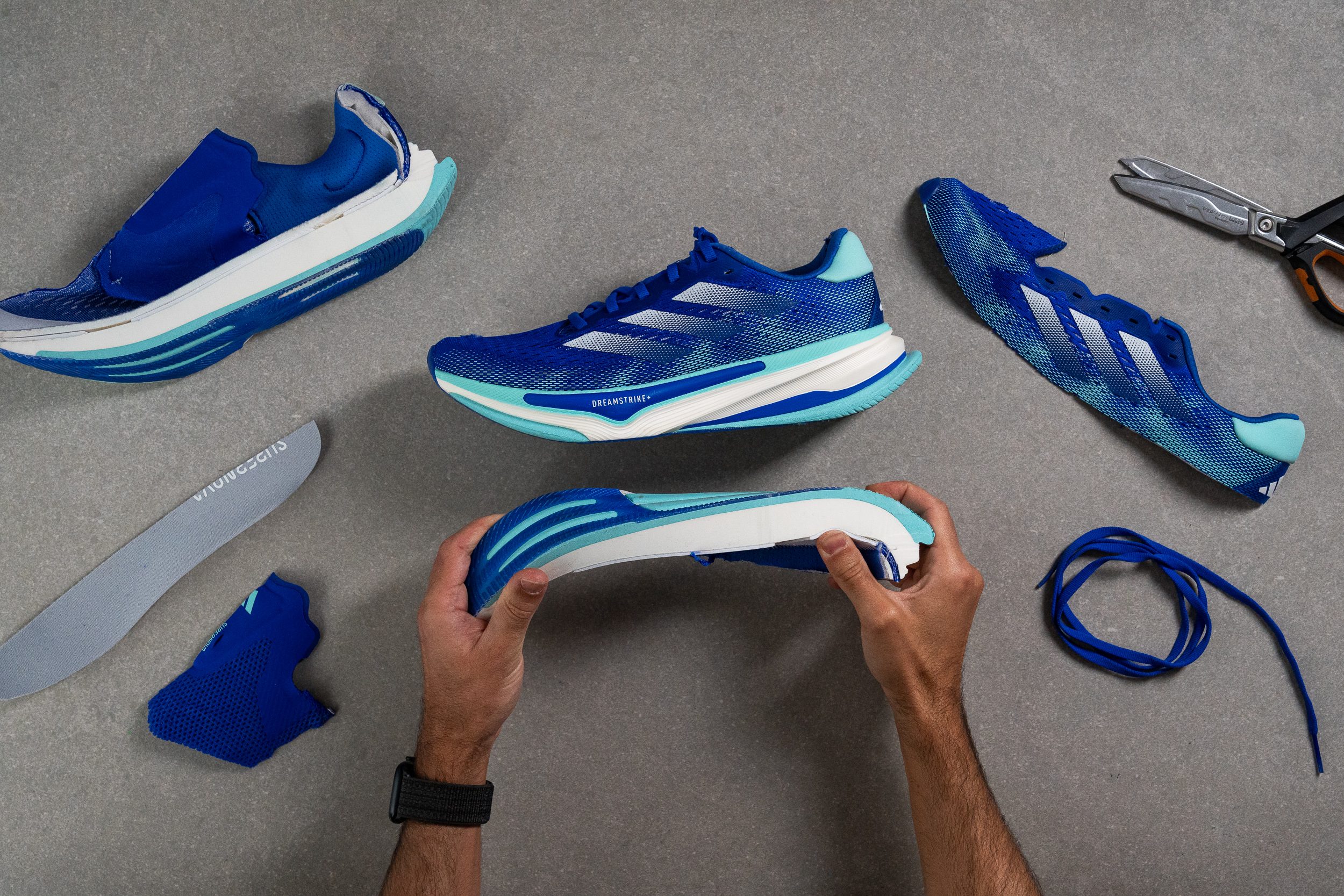
Cushioning
Shock absorption
The Supernova Prima delivers dependable shock absorption, landing a solid 129 SA in our lab test. While it doesn’t top the charts, this is a really strong result for a non-maximalist shoe and confirms its suitability for a wide range of runners.

| Supernova Prima | 129 SA |
| Average | 130 SA |
Energy return
Adidas revamped the Supernova line with the PEBA-based Dreamstrike+, and the payoff is clear. As detailed in our energy return guide, shifting away from EVA leads to better performance. In fact, only a handful of daily trainers reach 67.0% bounce in the heel.
| Supernova Prima | 67.0% |
| Average | 58.6% |
Heel stack
Those who found the Supernova Rise’s 32.5 mm stack a bit low will appreciate the Prima, which brings the heel up to a generous 36.1 mm. This extra foam is ideal for longer distances and supports heavier runners, offering just the right amount of cushioned comfort.
At the same time, it stays comfortably below the maximalist feel of the Adizero Prime X 2 Strung, keeping a balanced yet reasonable profile for a daily workhorse.
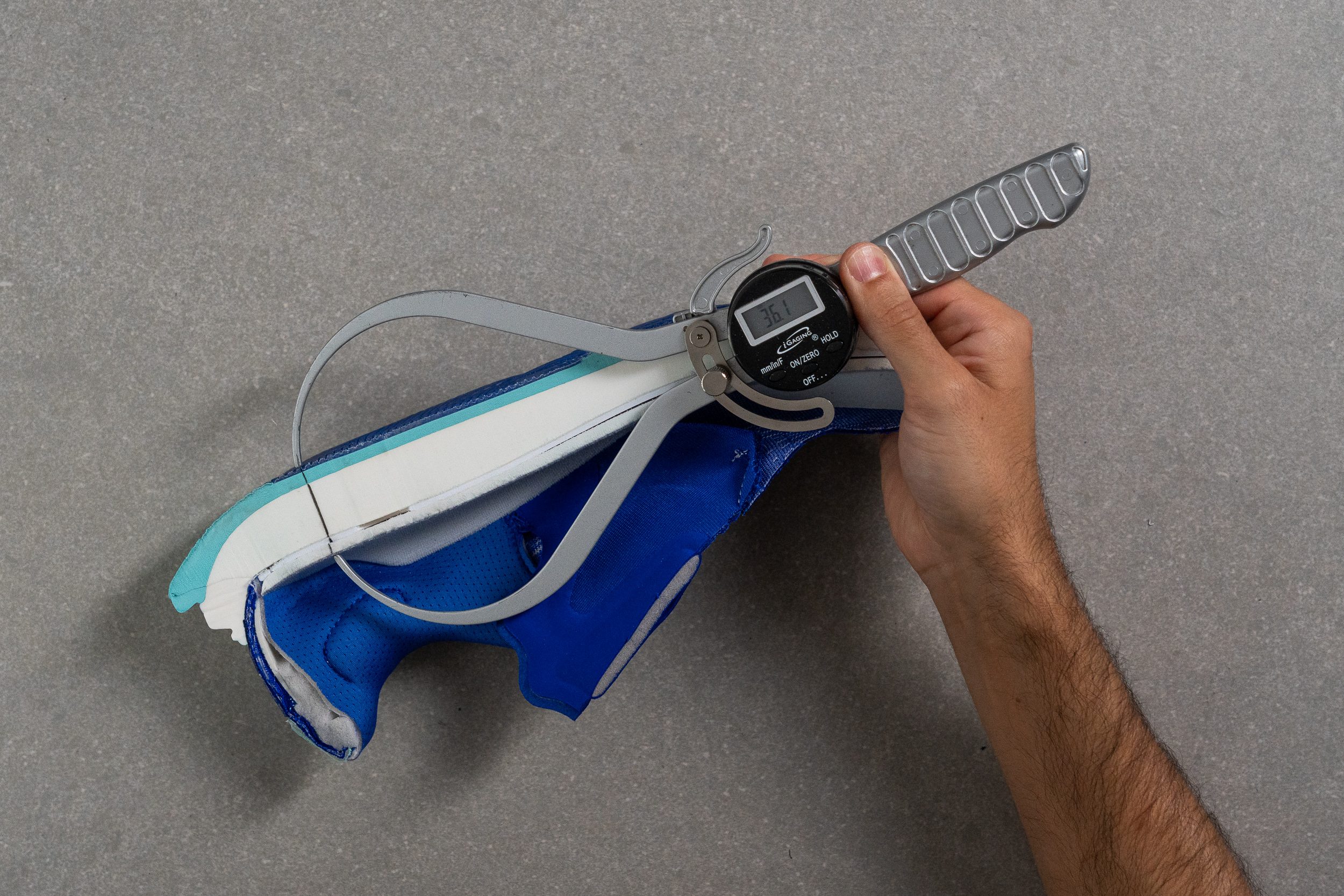
| Supernova Prima | 36.1 mm |
| Average | 34.8 mm |
Forefoot stack
The forefoot receives similar design attention, resulting in a solid 27.2 mm stack. This setup is ideal for forefoot and midfoot strikers focused on long-distance training, providing more muscle protection and reducing ground feel for added comfort.
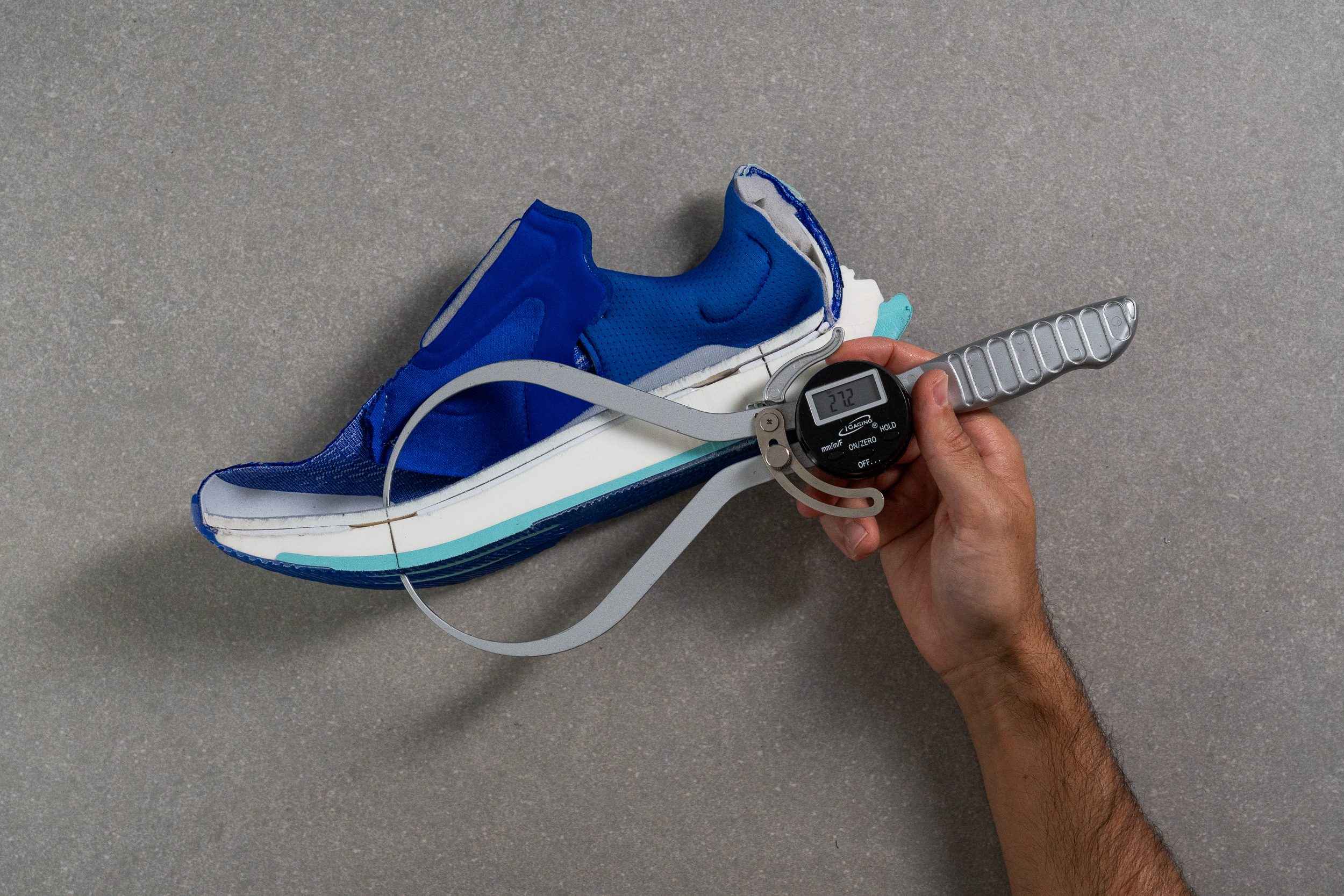
| Supernova Prima | 27.2 mm |
| Average | 26.2 mm |
Drop
In our lab, we tested Adidas’s claim that the Supernova Prima has an 8 mm heel-to-toe drop. Following World Athletics guidelines and using precise digital calipers, we found it to be 8.9 mm—nearly spot on!
We believe the Prima’s balanced drop smoothly adapts to various footstrikes. However, if you’re a forefoot striker seeking a lower drop shoe, the On Cloudsurfer Next might be a better fit, and it's a bit cheaper too!
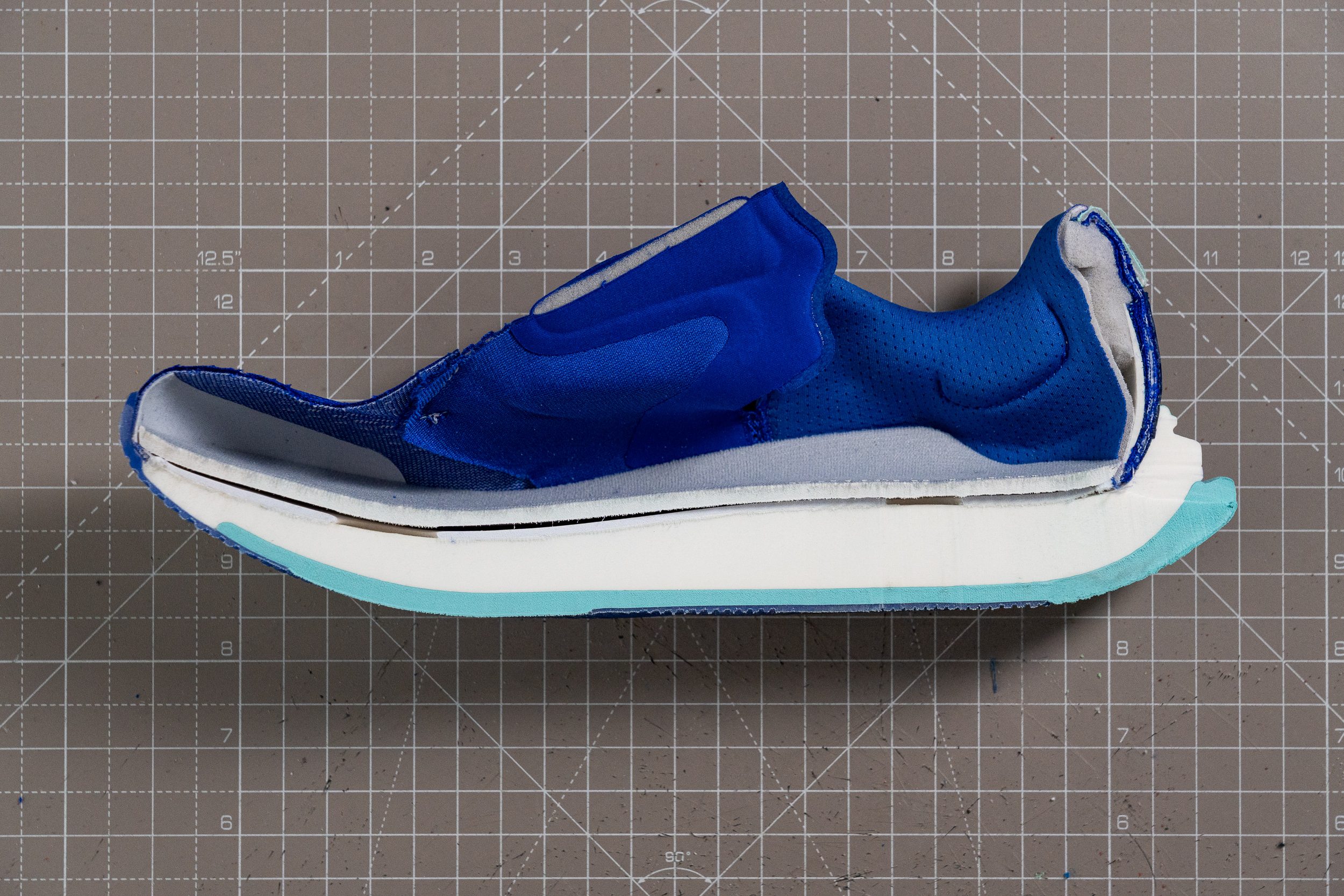
| Supernova Prima | 8.9 mm |
| Average | 8.6 mm |
Midsole softness
UpdatedAdidas has finally returned to the daily trainer podium after a 4–5 year hiatus launching underwhelming shoes, but now is equipped to compete with the best. The star of this comeback is their new Dreamstrike+ foam, which delivers a reliable mix of bounce, durability, and comfort.
Dreamstrike+ is a bio-based PEBA variant with a dense formulation that totally outshines EVA and TPU foams like Boost or Lightstrike 2.0. We found it pleasantly balanced in softness—neither overly plush nor overly firm—and our durometer confirmed it with a 35.6 AC reading.
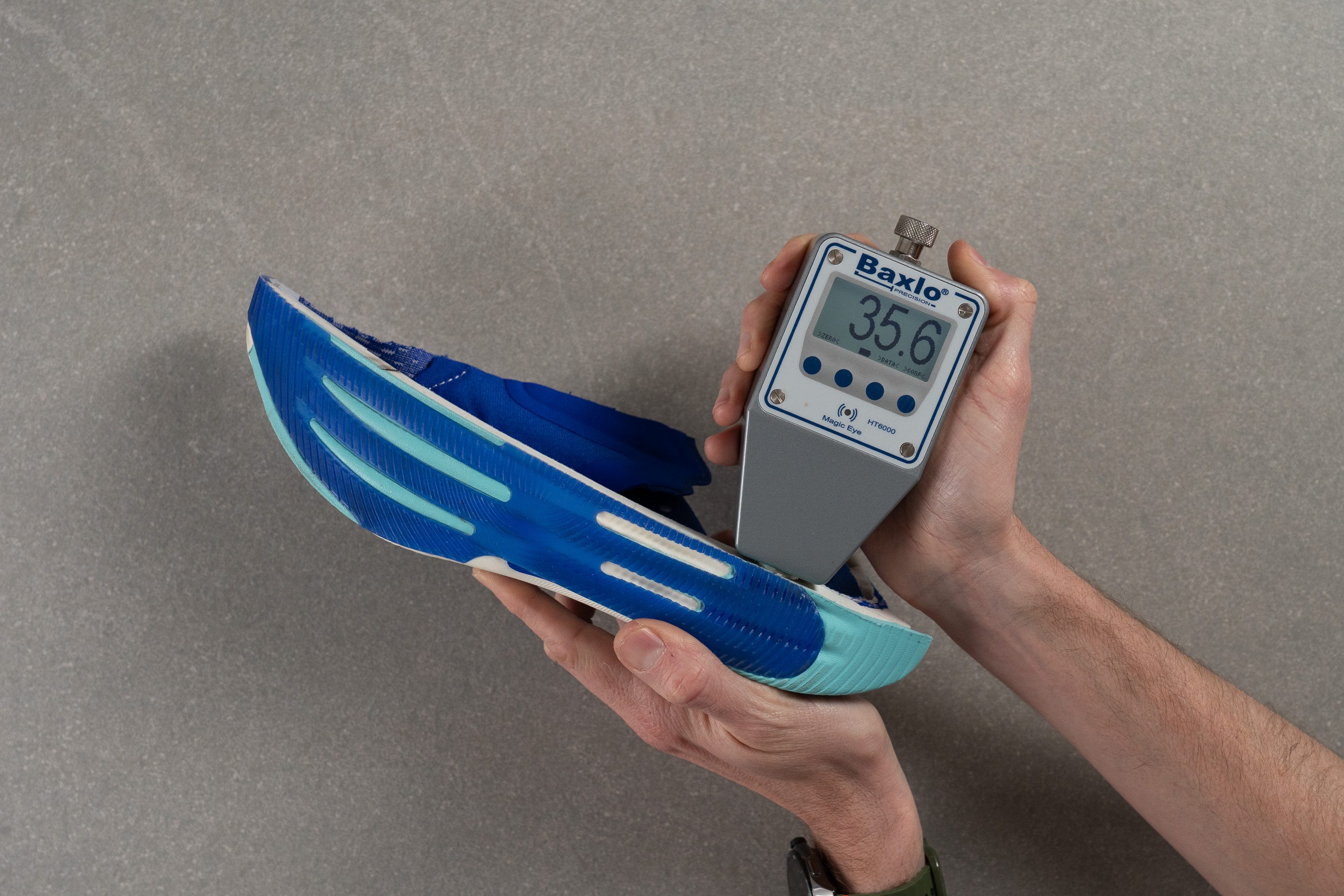
| Supernova Prima | 35.6 AC |
| Average | 36.3 AC |
Secondary foam
UpdatedThe Prima incorporates a super-firm secondary EVA layer to enhance stability. We measured it at 75.2 AC on our Asker C durometer, confirming its highly rigid, support-focused character.
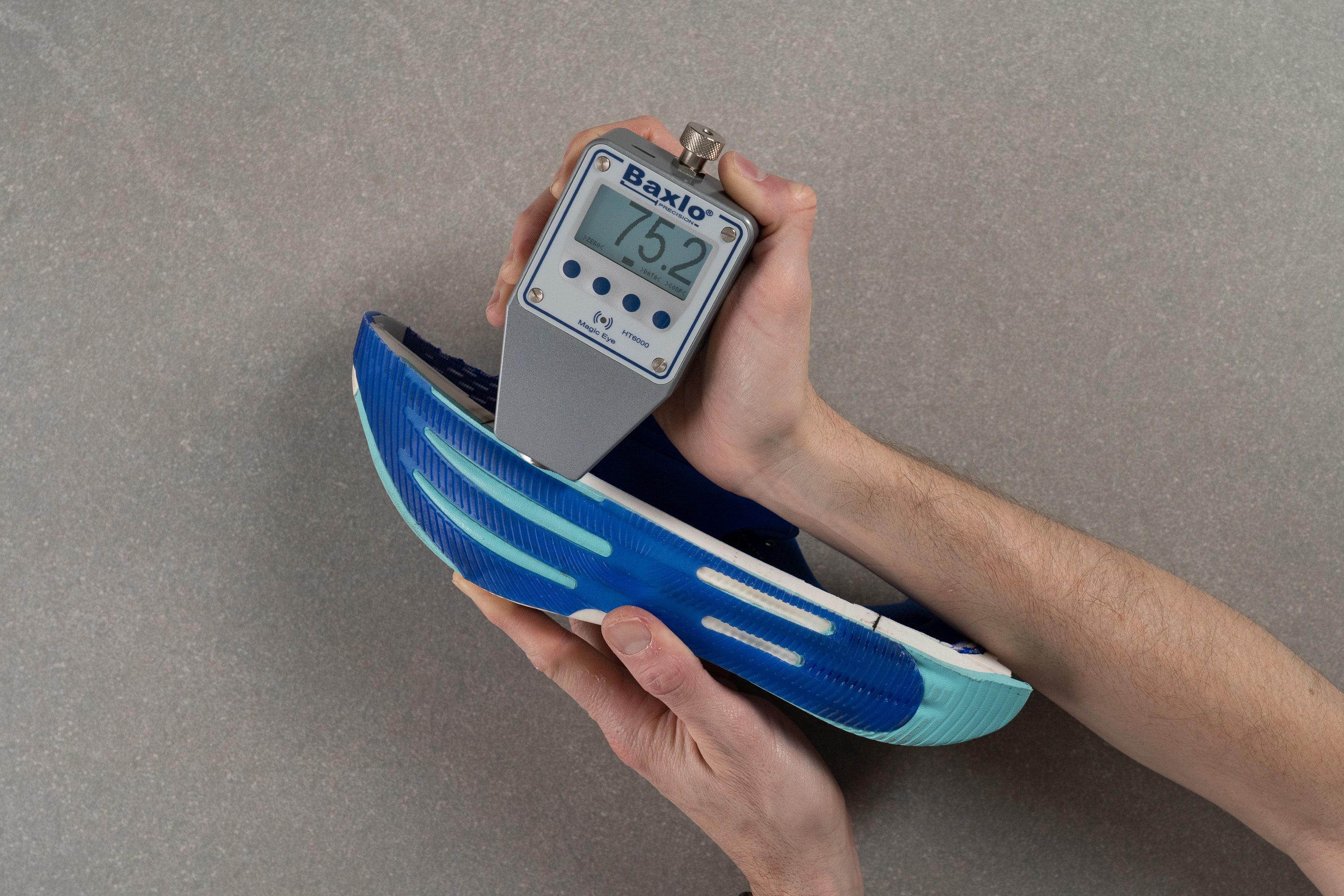
| Supernova Prima | 75.2 AC |
| Average | 39.1 AC |
Rocker
In our experience, Adidas often delivers a classic running experience in its trainers, but with the added stack height in the Supernova Prima, a touch of sole curvature was essential to maintain a lively, smooth ride.
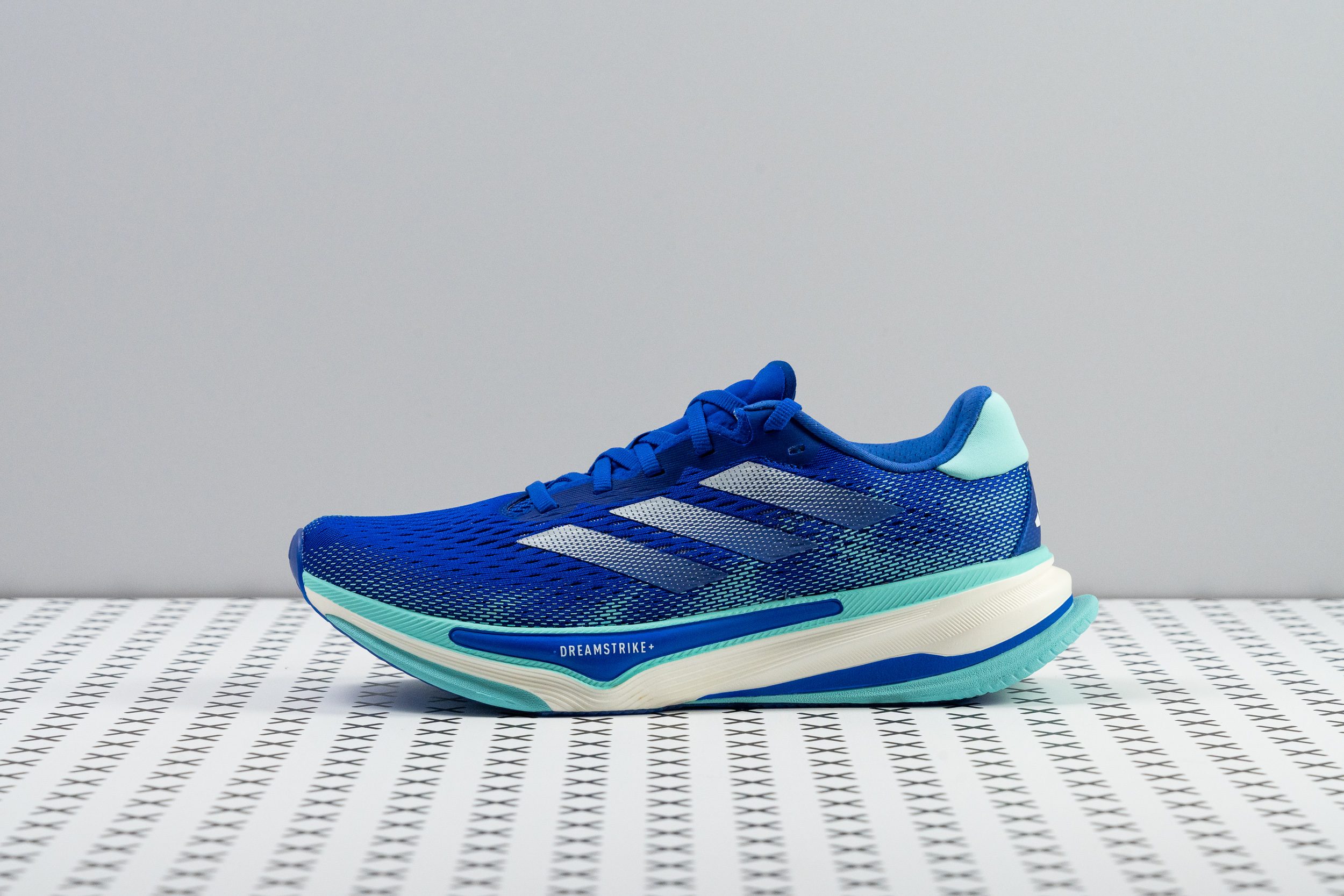
We found they achieved this balance with a smooth toe spring paired with a generous heel bevel that extends away from the midsole, enhancing the shoe's dynamic flow—especially beneficial for heel strikers.
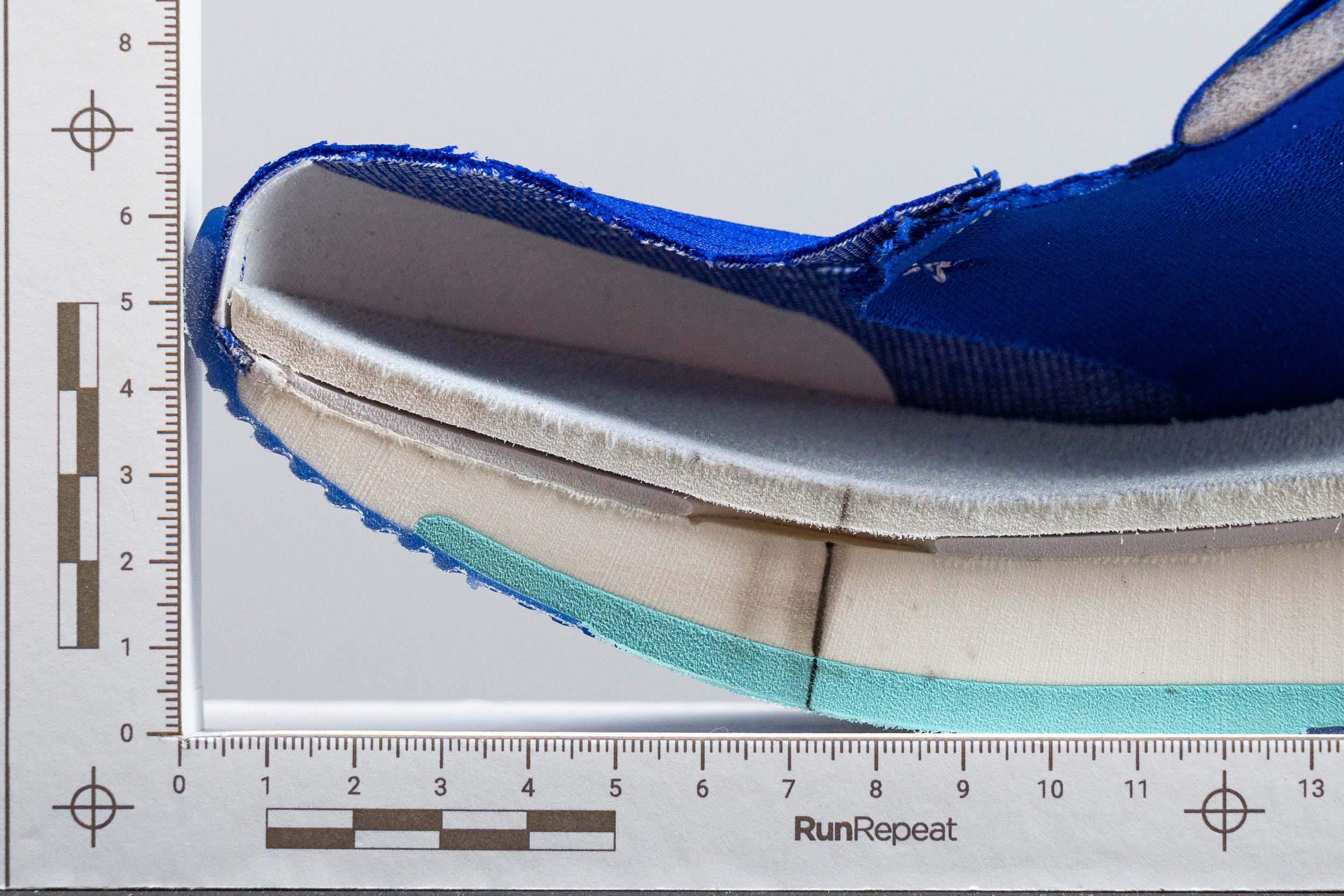
Size and fit
Size
Adidas Supernova Prima fits true to size (63 votes).
Internal length
| Supernova Prima | 272.4 mm |
| Average | 269.4 mm |
Width / Fit
The Supernova Prima felt adequately roomy for a D-medium running shoe and the gel mold of its interiors confirmed it.
With a welcoming width of 96.6 mm in the widest area of the shoe's upper, it falls right in the middle of medium-width running shoes.
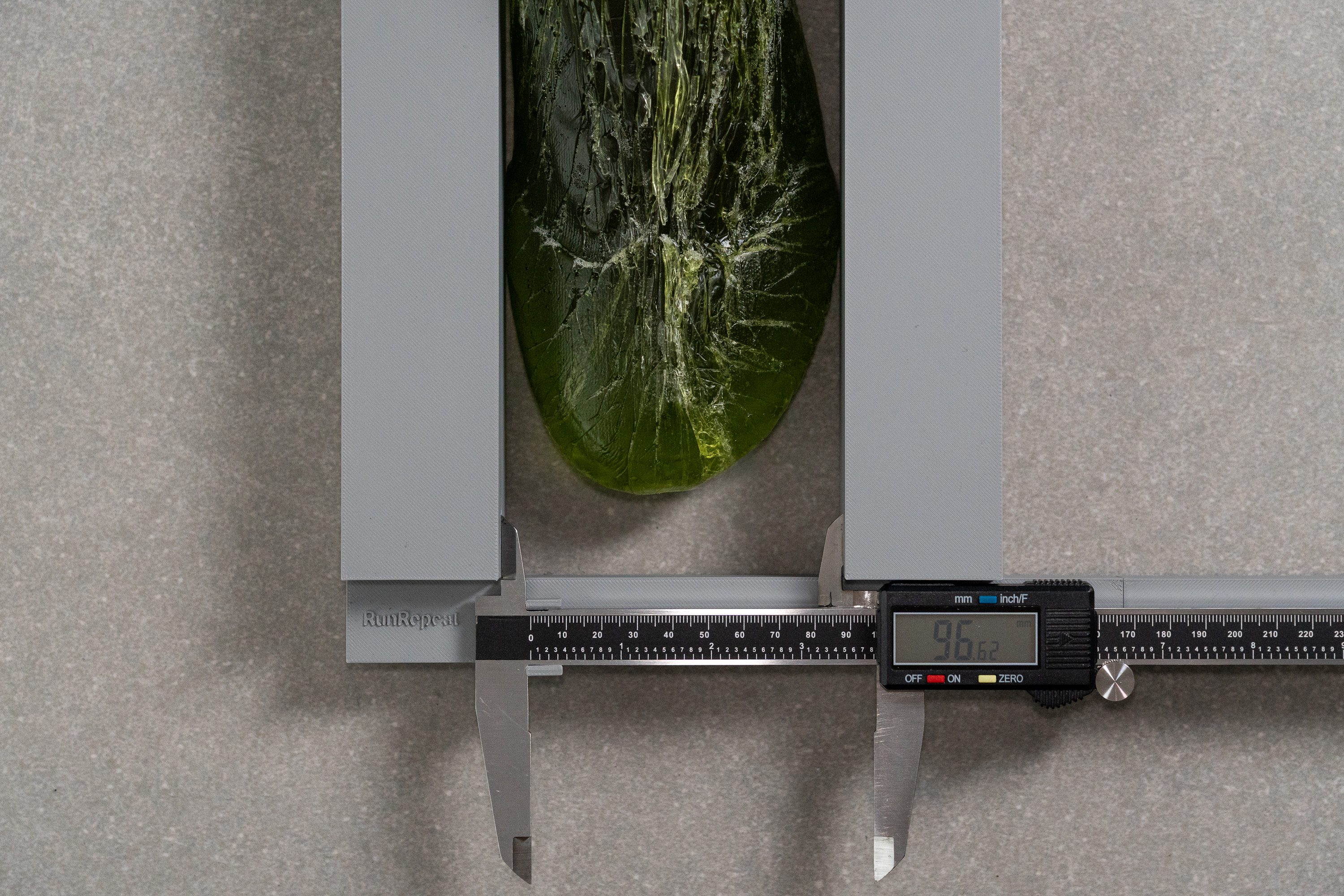
| Supernova Prima | 96.6 mm |
| Average | 95.2 mm |
Toebox width
What's more, this Adidas shoe doesn't have any aggressive tapering in the big toe area, remaining fairly rounded at 74.9 mm. This toebox shape makes it ideal for long runs when feet start to swell and ask for extra room.
However, in our experience, this generous fit may not suit runners with narrow feet. If that’s you, we suggest trying the Hoka Mach 6, which provides a tighter fit.
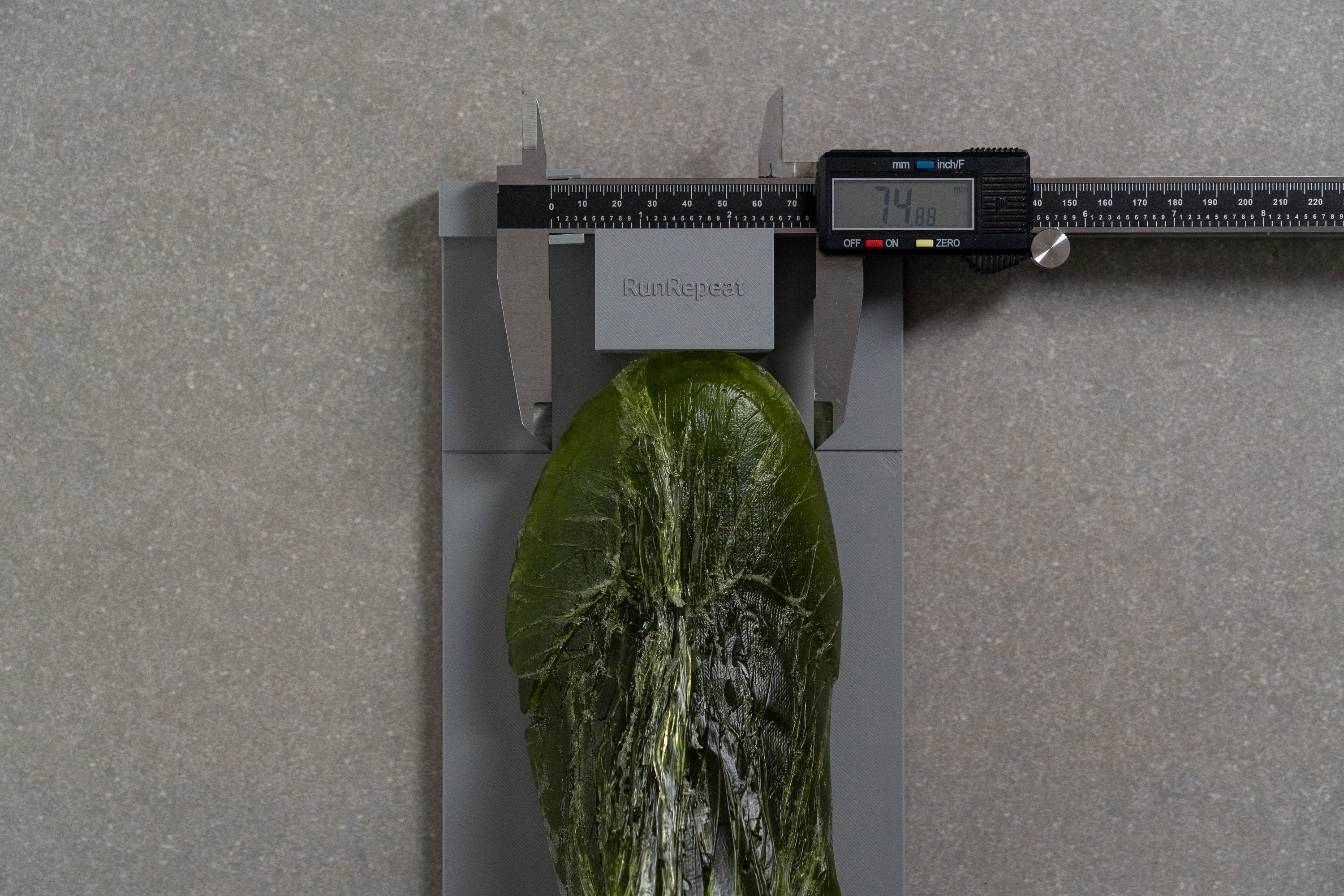
| Supernova Prima | 74.9 mm |
| Average | 73.3 mm |
Toebox height
The shoe's toebox height also contributed to the comfort, offering generous toe room and a plush, well-fitted upper that never felt restrictive.
We measured a standard toebox height of 28.1 mm in this Adidas shoe.
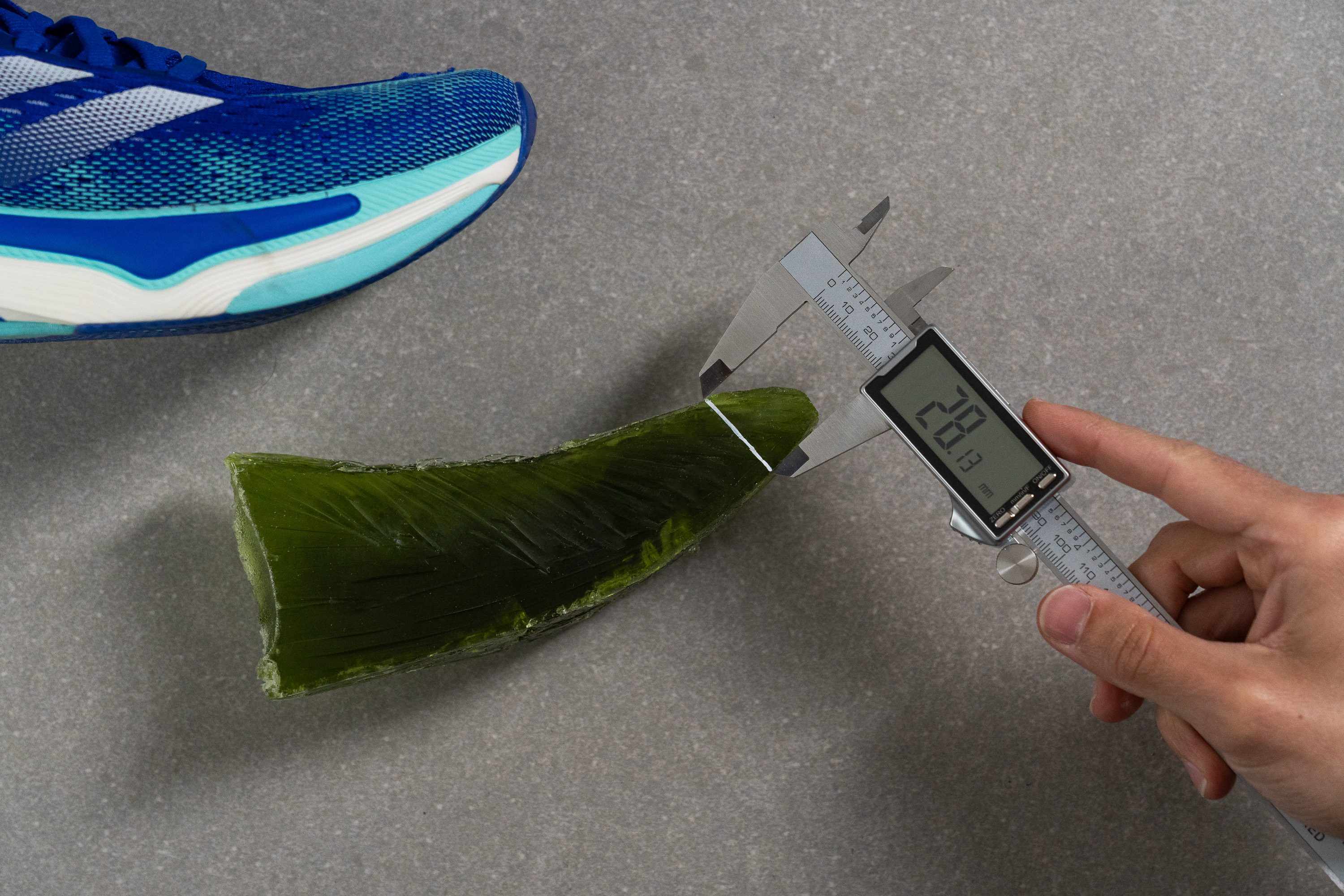
| Supernova Prima | 28.1 mm |
| Average | 27.1 mm |
Traction / Grip
Traction test
One of the biggest letdowns in this shoe is that, despite being the highest-priced model in the Supernova lineup, it skips Continental rubber entirely. Instead, Adidas went with a new compound called LIGHTTRAXXION.
We recorded a 0.43 score in our wet grip test—solid for both dry and rainy conditions. However, based on our findings, this new formula can’t match the awesome traction we consistently get from Continental’s rubber.
| Supernova Prima | 0.43 |
| Average | 0.49 |
Outsole design
The Supernova Prima features a two-part outsole built with Lighttraxion rubber in dark blue and rubberized EVA in light blue. Most of the heel and lateral edge use rubberized EVA, while LIGHTTRAXXION covers the main strike areas.
The design uses strips that alternate between both materials, offering targeted coverage across high-impact zones. Multiple cutouts split the outsole, helping with flexibility and shedding some weight.
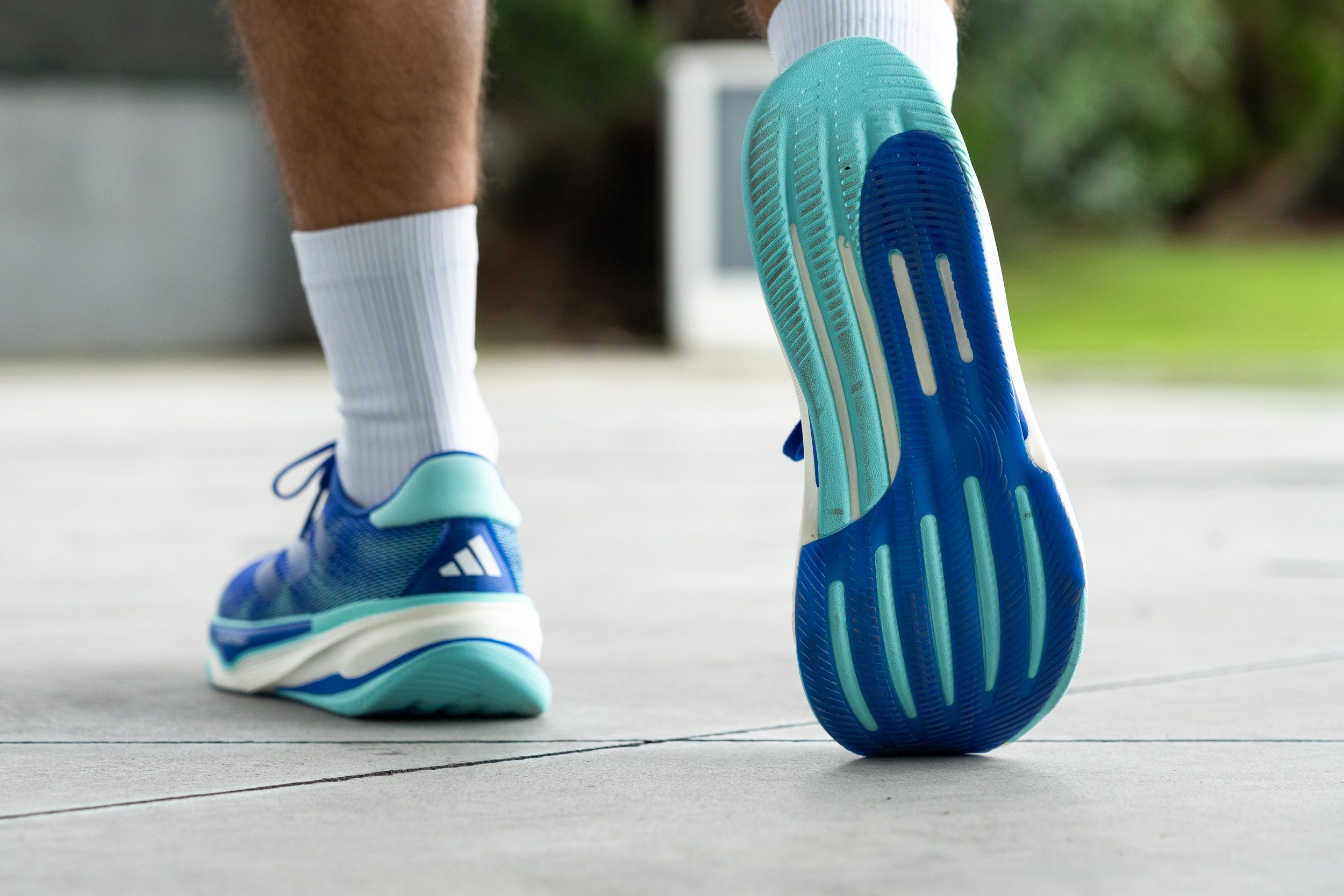
Flexibility / Stiffness
In our test runs, we discovered that despite its slightly rockered shape, the Supernova Prima maintains a smooth, flexible feel during our runs. And we found that the Support Rods didn’t hinder flexibility at all—requiring just 12.4N to bend it to 30 degrees in our lab, making this shoe an excellent choice for walking too!
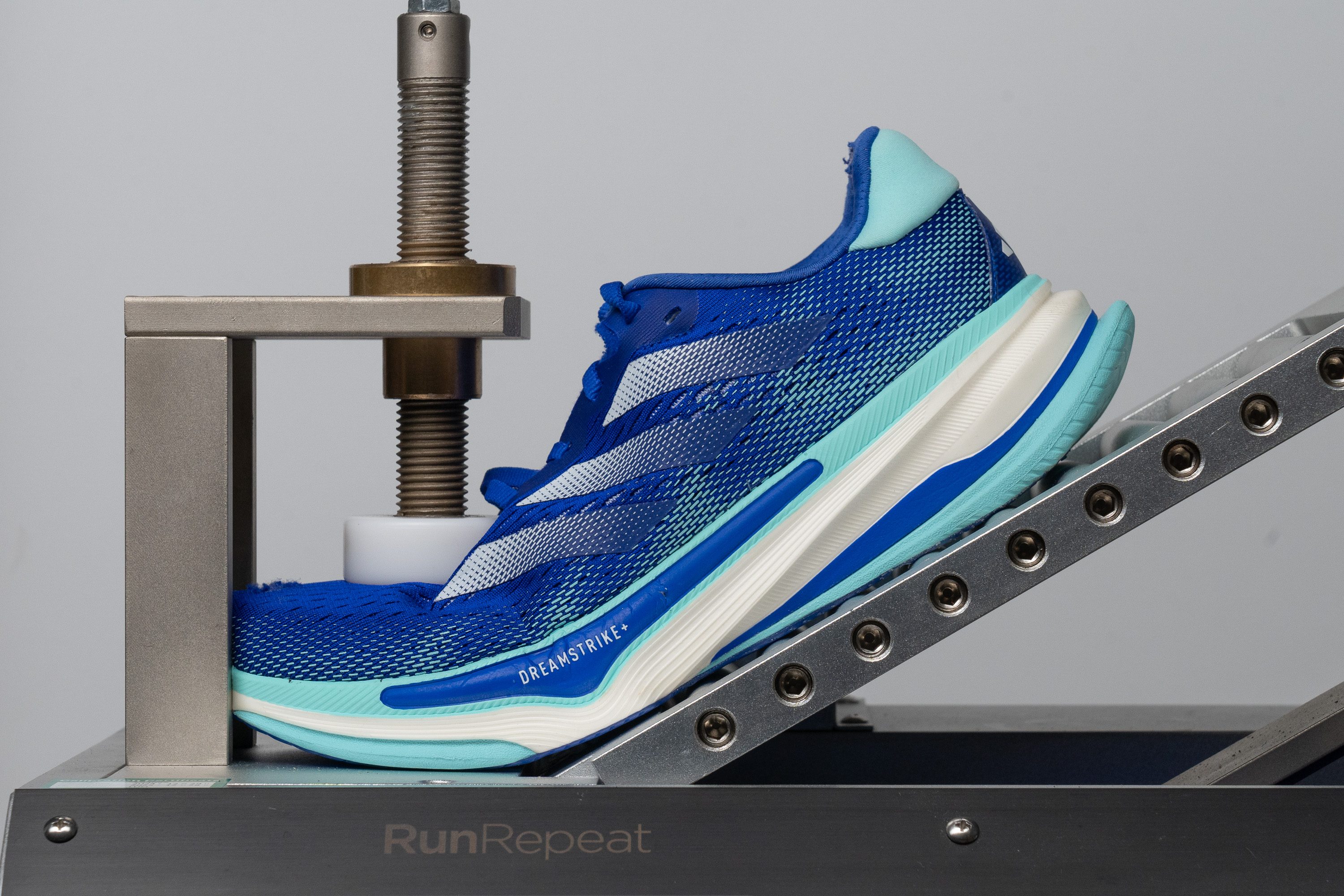
| Supernova Prima | 12.4N |
| Average | 15.3N |
Weight
In terms of weight, we usually call the 10-oz threshold as the line where trespassing it makes a daily trainer going into the heavier side, and the Supernova Prima saved this situation at the limit, weighing 9.9 oz or 281g in our scale.
And Adidas really tried to shave grams everywhere. The tongue is engineered to strip a bit of padding, the upper is lightweight, and as we proved before, the outsole features less rubber than the norm in shoes of its kind.
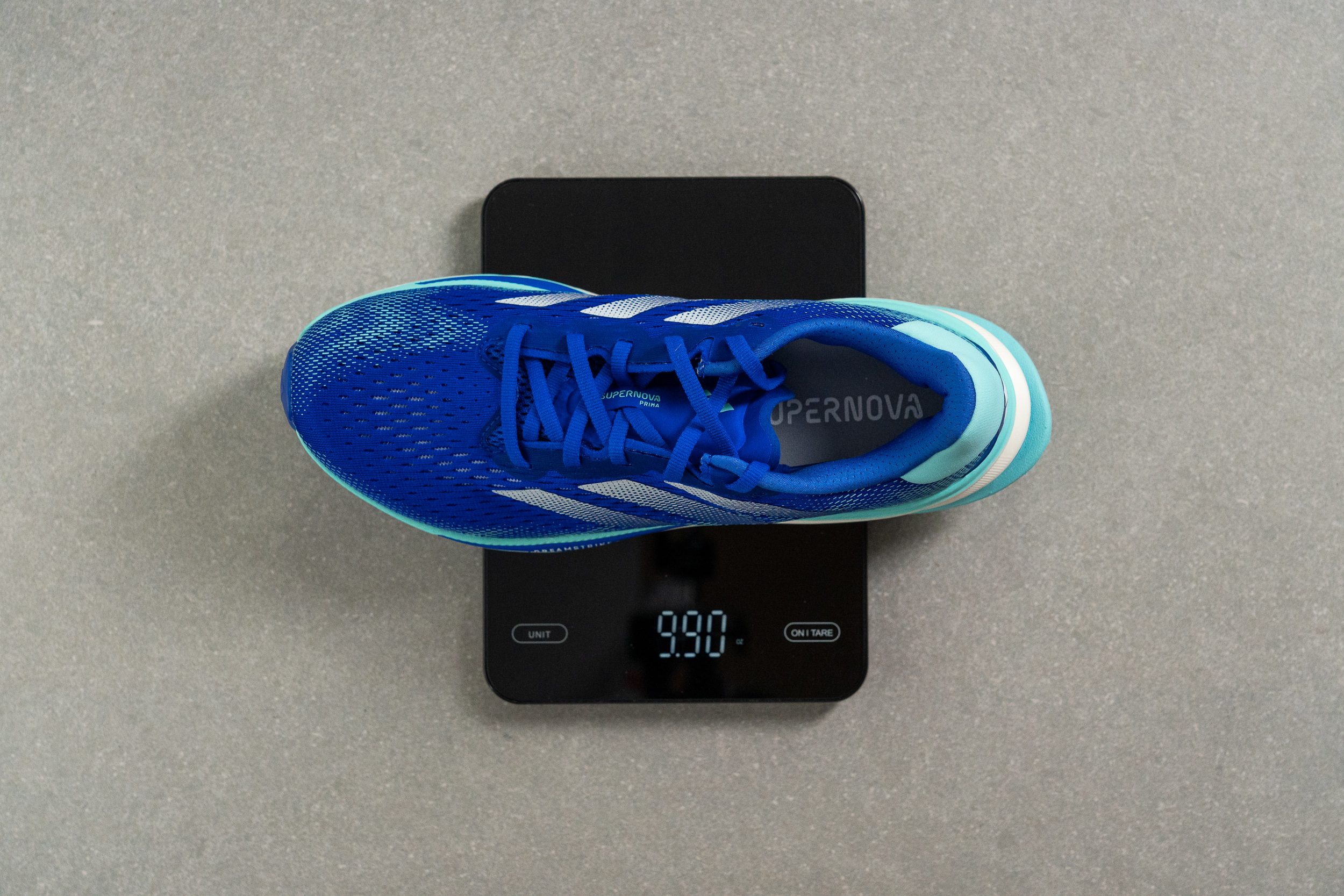
| Supernova Prima | 9.9 oz (281g) |
| Average | 9.3 oz (264g) |
Breathability
We believe that a daily running shoe needs to perform reliably in any weather, and for this, a score of 3 to 4 in our test is ideal. The Prima delivered with a solid 4.
Adidas designed large ventilation holes in the toebox, extending into the lateral and medial sides, which provided excellent airflow on the hottest days of the year.
Using our digital microscope, we found that the Supernova Prima’s engineered mesh upper combines a thick outer layer with a softer, white fabric, adding plush comfort without hindering airflow.
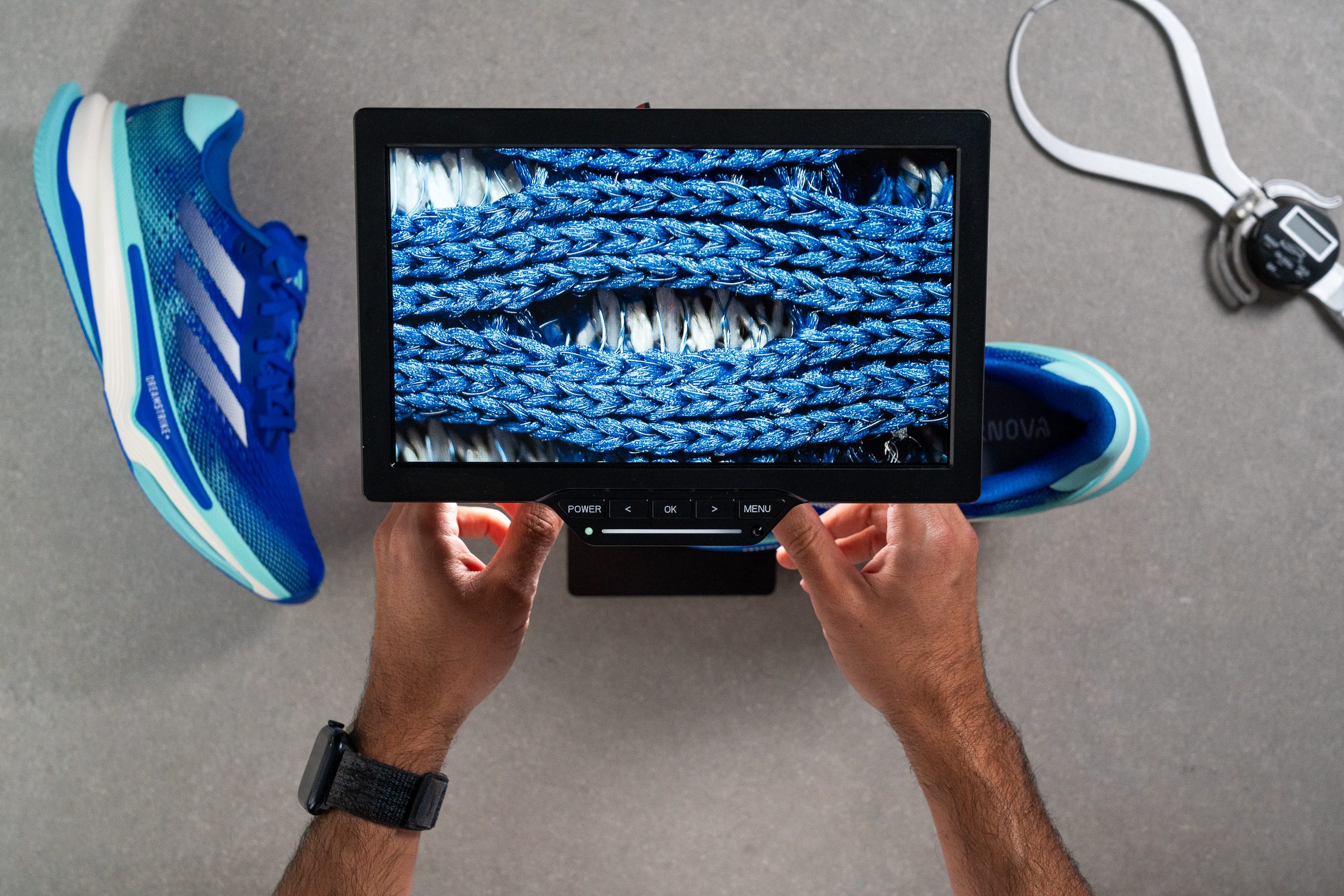
The upper may not be stretchy, but it’s impressively cushioned, especially around the heel area.
Adidas put strong emphasis on Achilles protection, and for good reason—this shoe features a firm heel counter to boost stability, which could irritate the tendon without sufficient padding.
| Supernova Prima | 4 |
| Average | 3.7 |
Stability
Lateral stability test
The Supernova line from Adidas is crafted as a neutral running shoe series, yet we found they’ve incorporated so many stability reinforcements that it can easily support runners with mild pronation, making it more appealing to a wider range of individuals.
Torsional rigidity
In our experience, one reason this shoe feels close to a stability shoe is its high torsional rigidity—we rated it a solid 4/5, just below the max score. This added stiffness keeps forces centered, enhancing stability, but at the same time, it's a small downgrade when running at easy paces.
| Supernova Prima | 4 |
| Average | 3.5 |
Heel counter stiffness
In our view, Adidas clearly aims to give heel strikers a secure feel in this shoe. With an ultra-stiff 5-out-of-5 heel counter, it controls forces effectively, guiding the heel in a straight line—though it slightly downgrades comfort.
To counterbalance the stiffness, Adidas added ample padding to improve comfort, yet we wouldn’t recommend it for runners with sensitive heels, Haglund’s deformity, or those who prefer a flexible heel counter. That said, runners with mild pronation issues will likely find it amazing.
| Supernova Prima | 5 |
| Average | 2.9 |
Midsole width - forefoot
We believe the previous tests showed stability-like results because Adidas maintained standard dimensions to manage weight and prevent a bulky feel. For example, the forefoot measured 114.6 mm, comparable to most daily trainers.
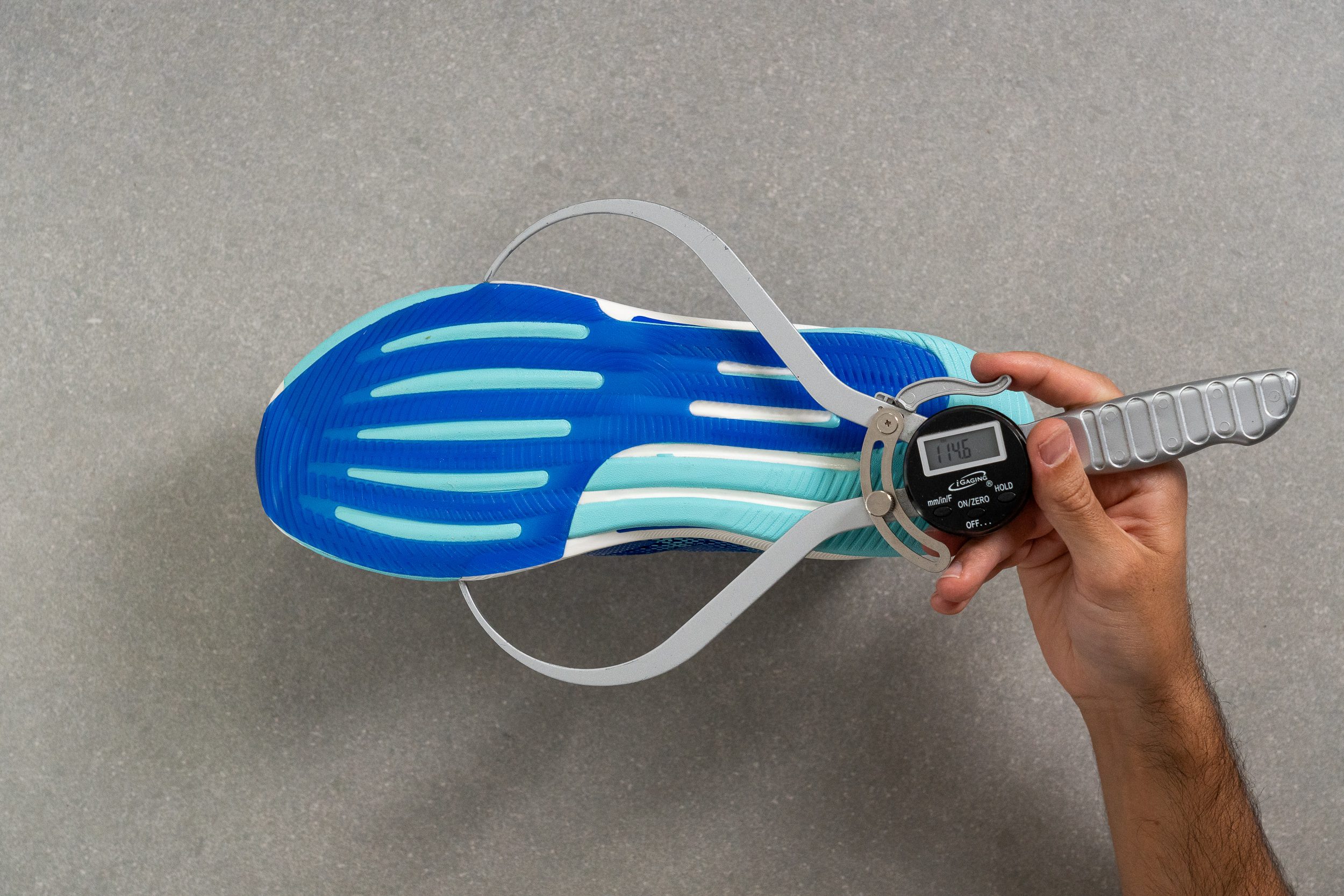
| Supernova Prima | 114.6 mm |
| Average | 114.4 mm |
Midsole width - heel
The heel width is quite similar to models like the Nike Pegasus 41, arguably the most "standard" daily trainer. However, Adidas introduces a key design difference in the midfoot. As seen in our photo, the midfoot area doesn’t taper but stays noticeably wide, enhancing stability and appealing to runners with mild stability needs.
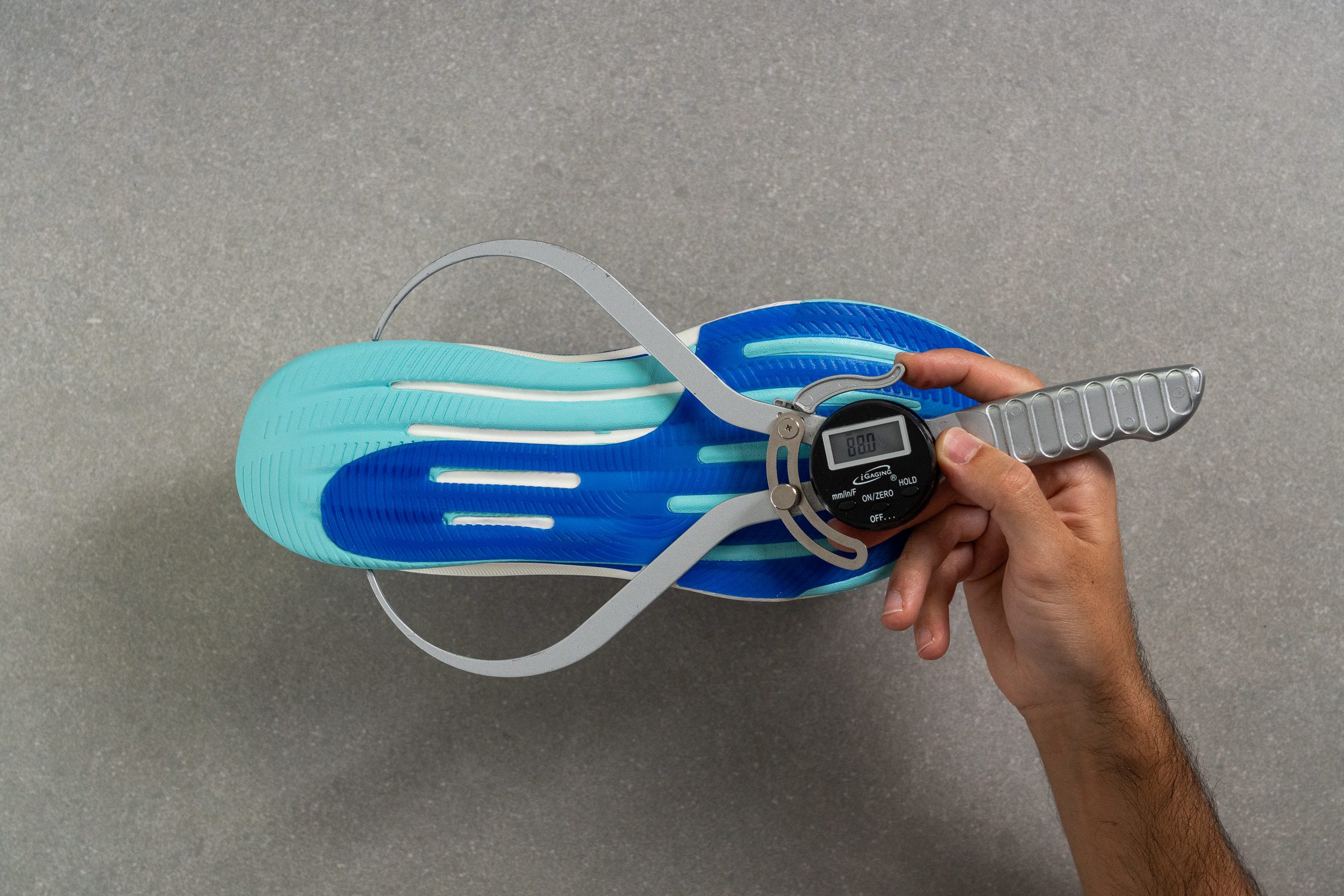
| Supernova Prima | 88.0 mm |
| Average | 90.6 mm |
Support Rods
One standout innovation in the new Supernova lineup is the addition of Support Rods, prominently visible in light blue along the forefoot. These rods extend throughout the midsole, providing a balanced, more centered ride.
This feature exemplifies how performance-driven technology can enhance training shoes. We found that these Support Rods are clearly inspired by Adidas' carbon-infused Energy Rods, which boost speed and stability in models like the Adizero Boston 12 and Adizero Adios Pro 3.
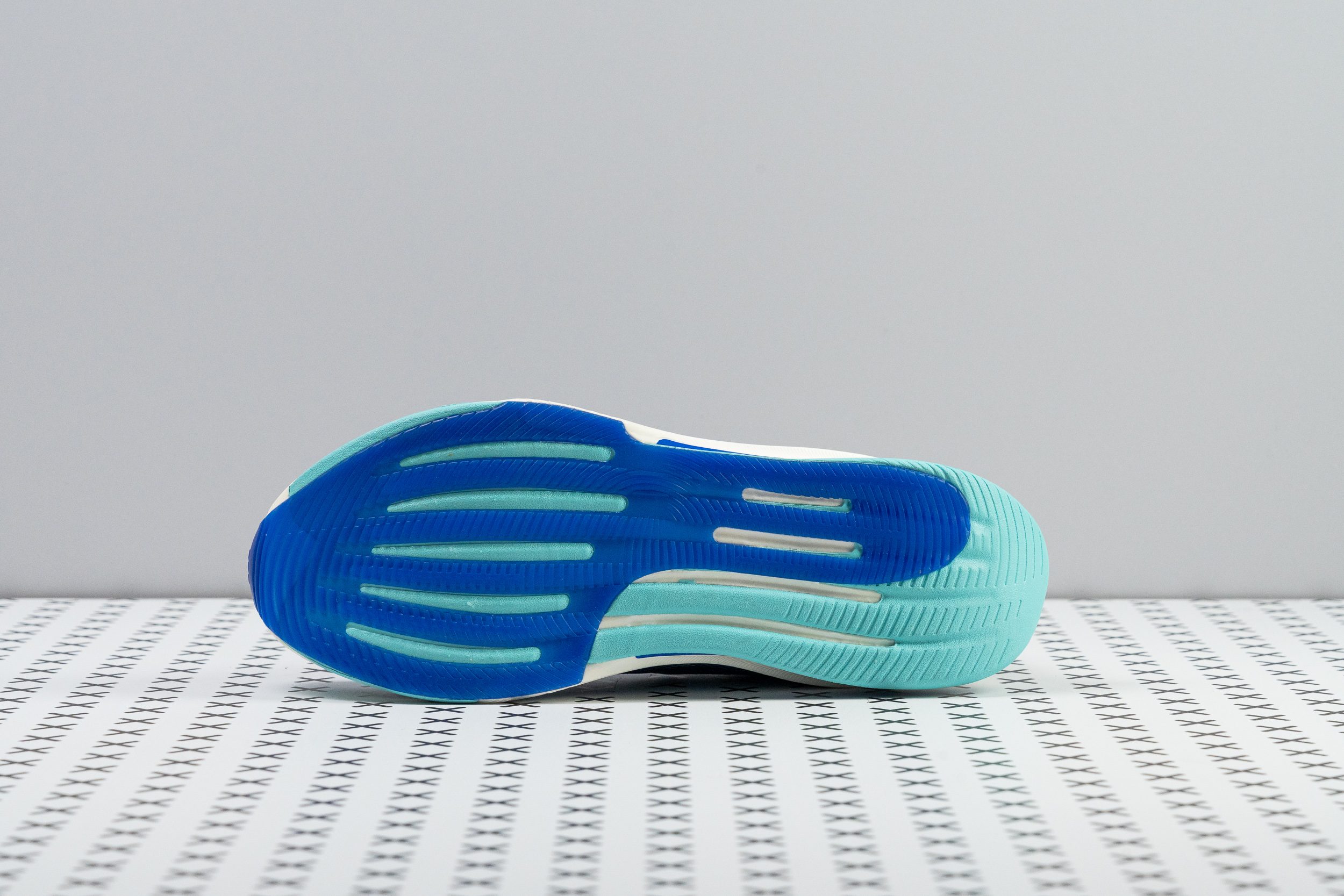
Heel bevel
In our view, heel bevels are a hallmark of Adidas’ design, and the German brand pushes these bevels to the extreme in the Supernova Prima, trying to control lateral motion and centering the foot from the very first contact.
This focus may work wonders for some heel strikers, offering a centered, stable feel. However, others might find this nearly rigid approach too intrusive for a neutral shoe.
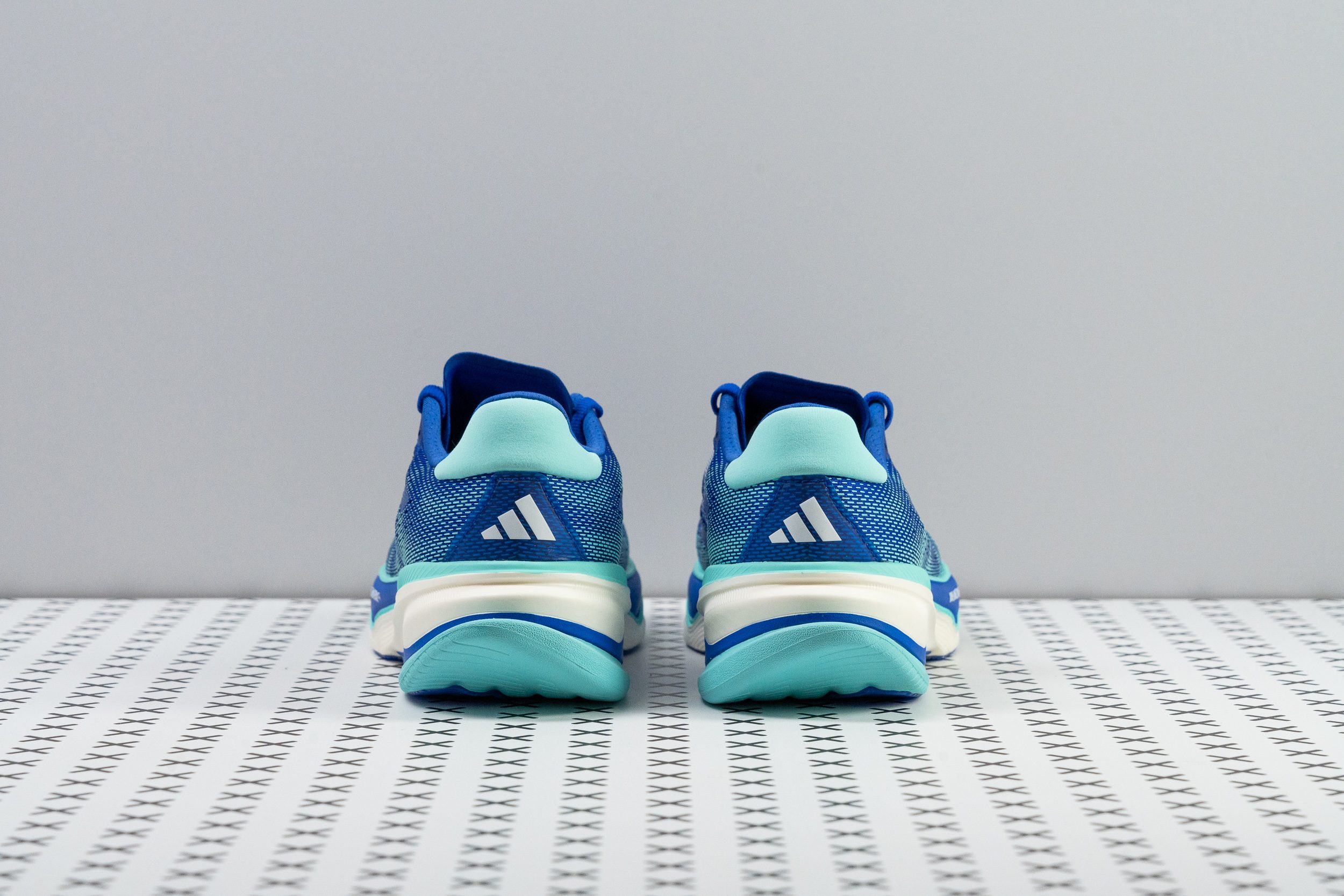
Durability
Toebox durability
Our initial Dremel test, as always, targeted the toebox. We were optimistic, knowing engineered mesh uppers usually withstand stress well—certainly more so than knit versions.
The toebox earned a solid 3/5 score, the same that we found in the knit-based Ultraboost 5. While not groundbreaking, this result left us satisfied.
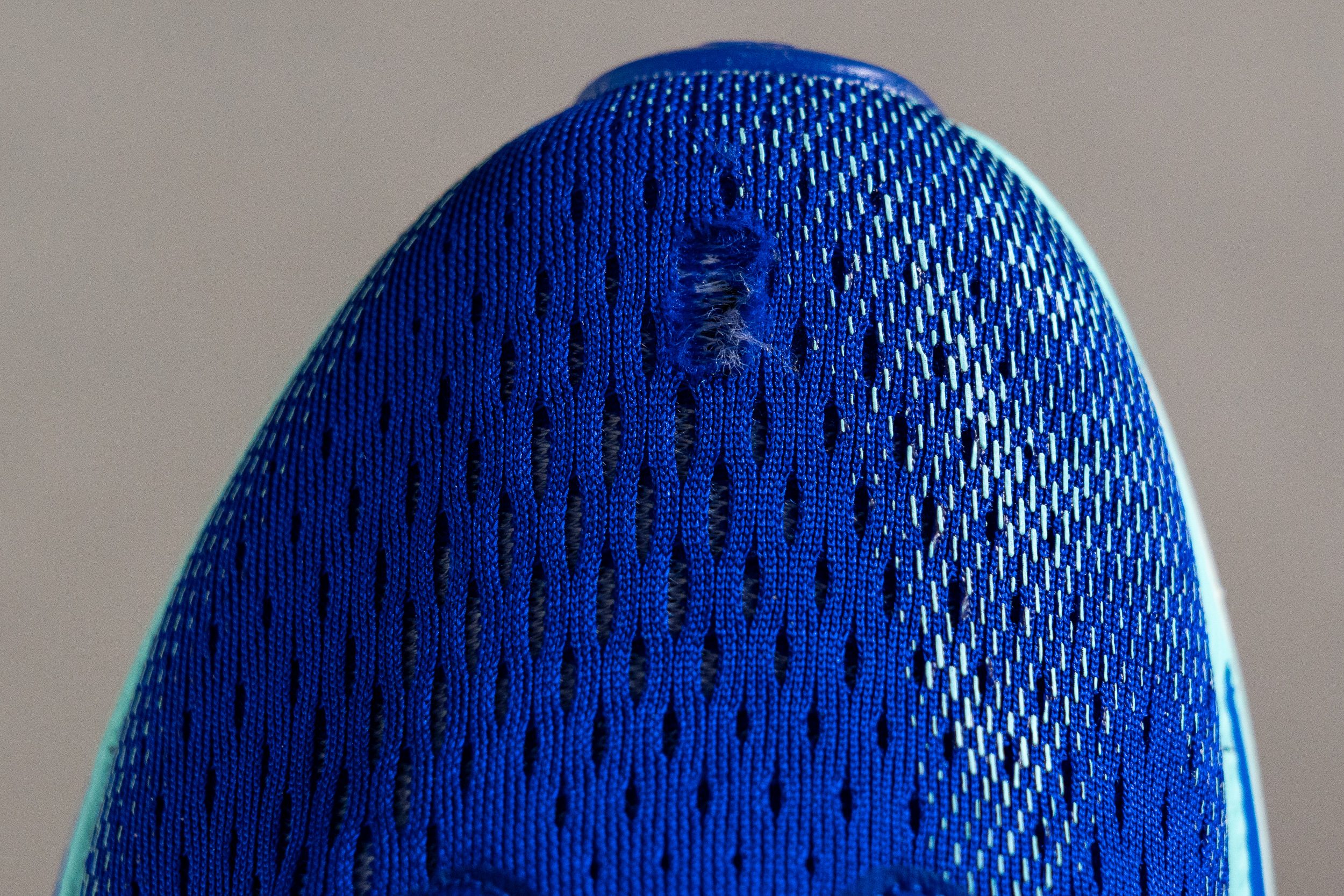
| Supernova Prima | 3 |
| Average | 2.6 |
Heel padding durability
We mentioned the plush, pillow-soft heel padding earlier—well, it brings a durability issue along with it.
In our view, Adidas invested heavily in creating a luxuriously cushioned heel. But when we tested its resilience with our Dremel, it turned out to be a true letdown (1/5) in terms of durability.
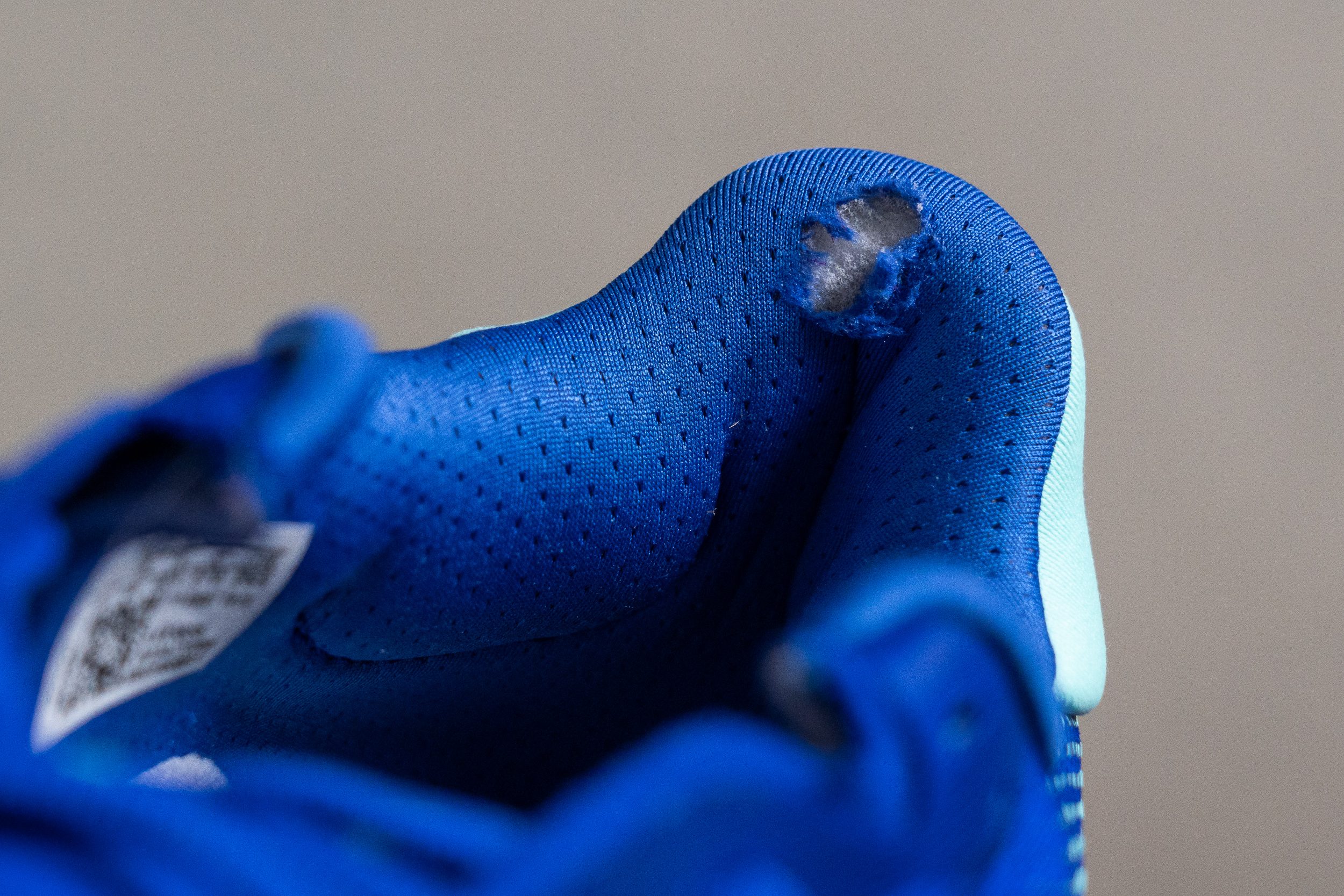
| Supernova Prima | 1 |
| Average | 3.4 |
Outsole durability
In terms of durability, we knew not to expect Continental-level resilience, but we hoped for something stronger than what we found.
After putting the shoe through our final Dremel test, we measured a less-than-stellar 2.1 mm wear depth. This score places the shoe far from being the durability powerhouse that other Adidas trainers have been.
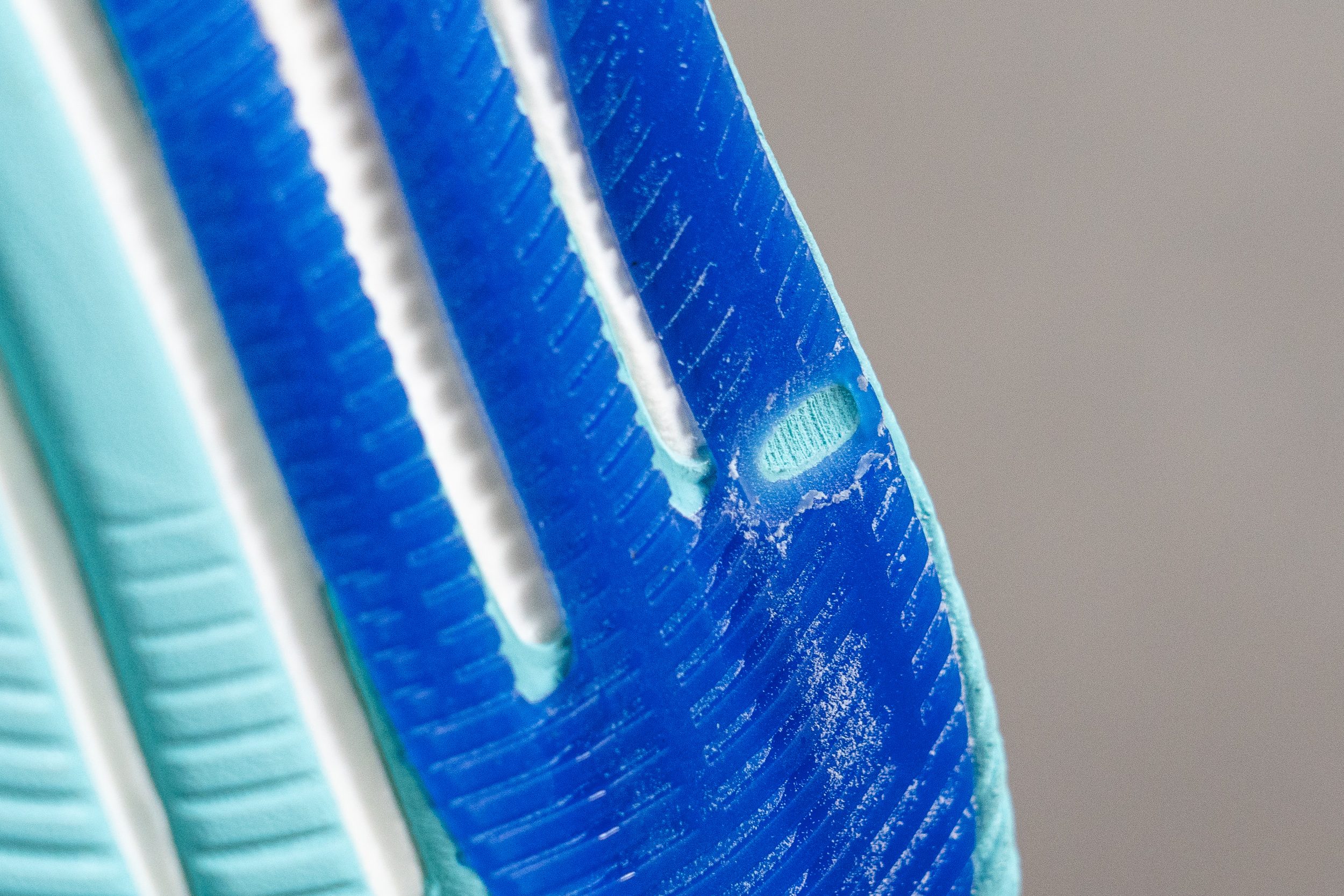
| Supernova Prima | 2.1 mm |
| Average | 1.1 mm |
Outsole thickness
We grew even more concerned when we measured only 2.2 mm of Lighttraxion rubber—well below the average for daily trainers. For this reason, we believe this shoe isn’t ideal for runners who quickly wear down outsoles, though it should offer sufficient lifespan for everyone else.
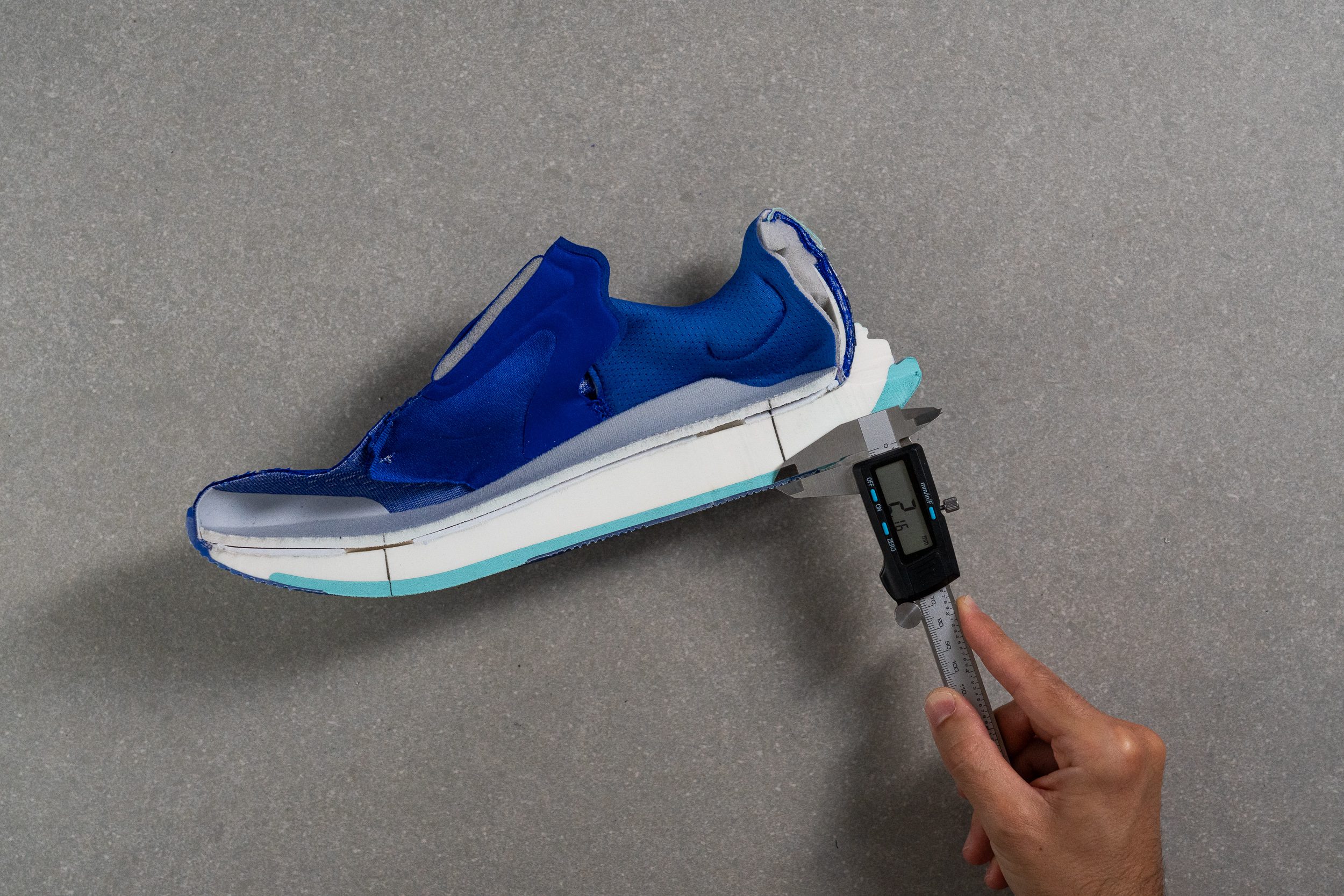
| Supernova Prima | 2.2 mm |
| Average | 3.2 mm |
Misc
Insole thickness
After removing and carefully measuring its thickness, we found the insole to be 4.2 mm—an average measurement.
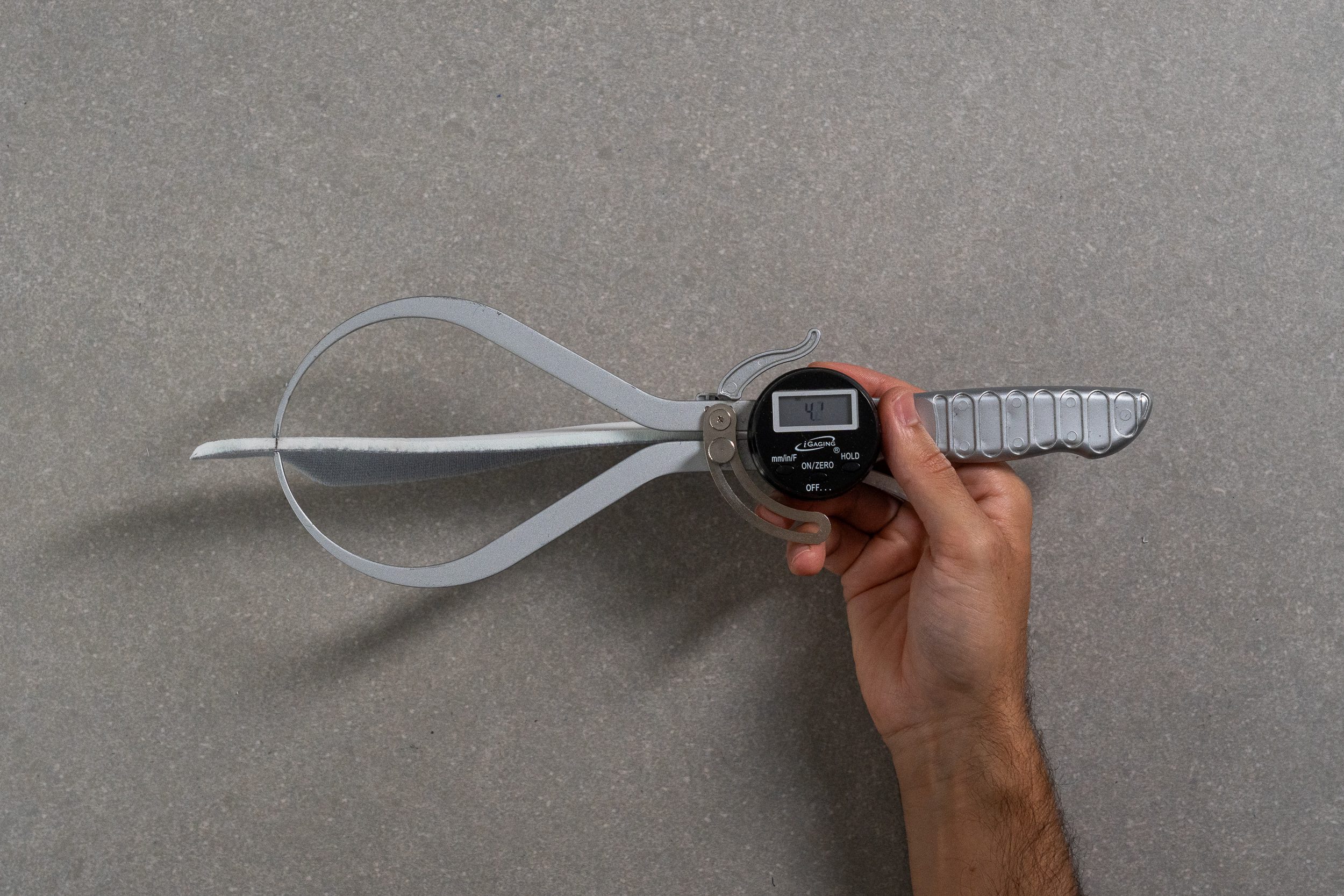
| Supernova Prima | 4.2 mm |
| Average | 4.5 mm |
Removable insole
The insole is removable, as it’s not glued to the last. However, swapping it out means losing those lateral flaps for added stability and comfort. It’s not a huge drawback, but we think it’s worth noting.
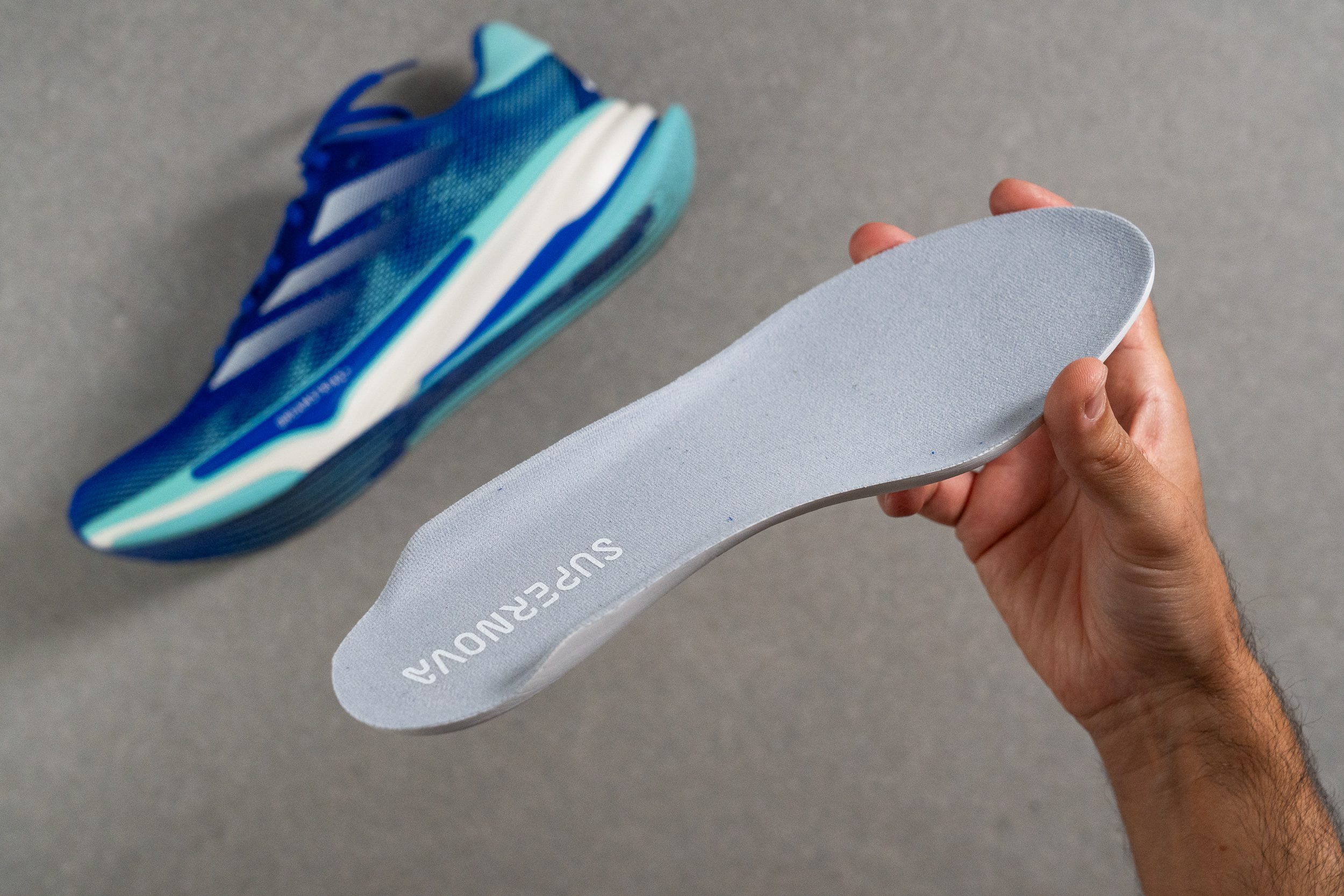
| Supernova Prima | Yes |
Midsole softness in cold (%)
One standout feature of PEBA-based foams is their remarkable stability across hot and cold temperatures—a stark contrast to the behavior we observed in EVA foams, which tend to vary significantly.
Dreamstrike+ demonstrated an impressive 10% change in softness after 20 minutes in our freezer, delivering one of the most amazing performances we’ve tested in a daily trainer.
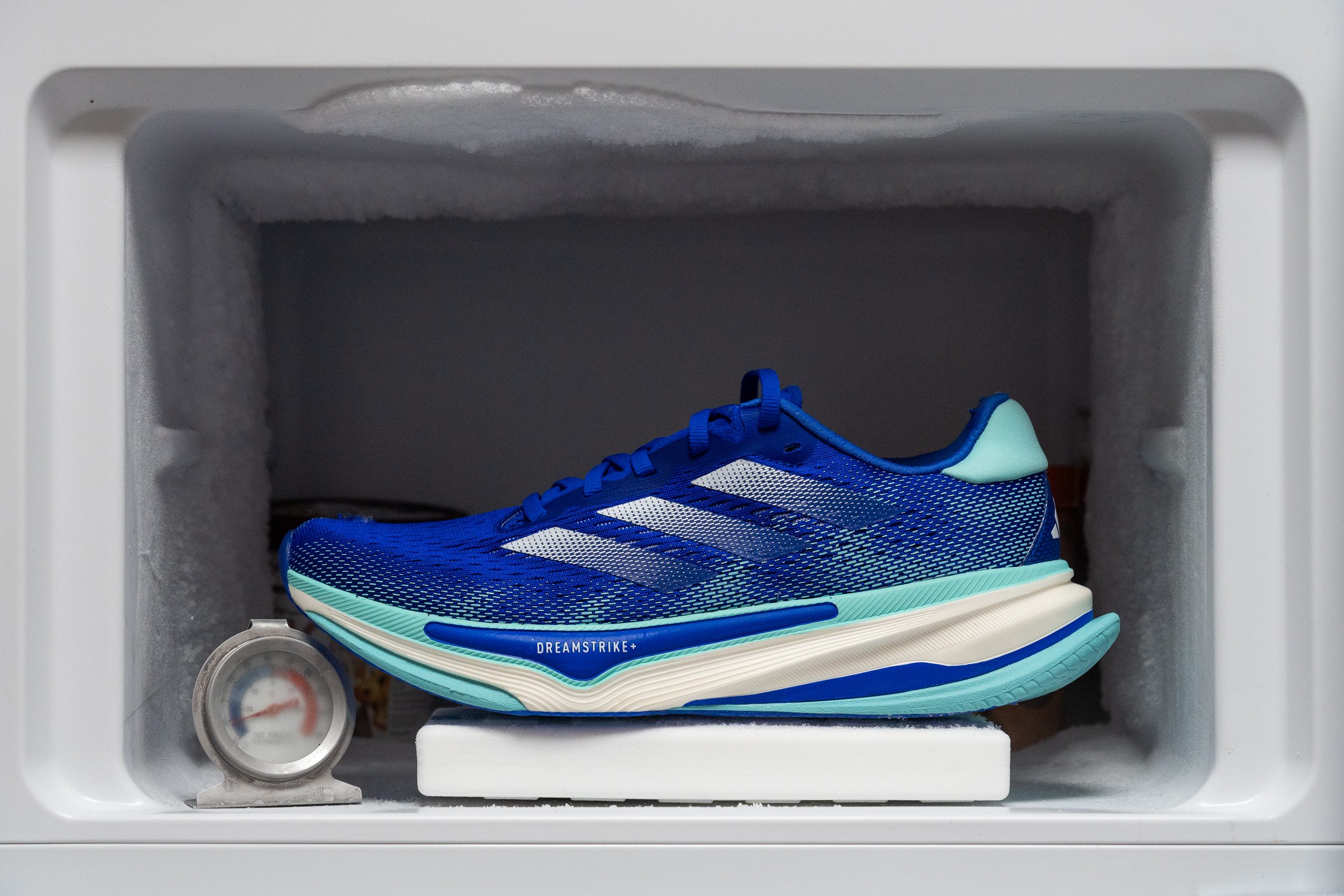
| Supernova Prima | 10% |
| Average | 24% |
Reflective elements
This shoe is a solid daily trainer that includes almost everything we look for in this category. However, it lacks reflective elements—a feature we value for the added safety it brings without much cost. Honestly, how much could Adidas have saved here? 10 cents?
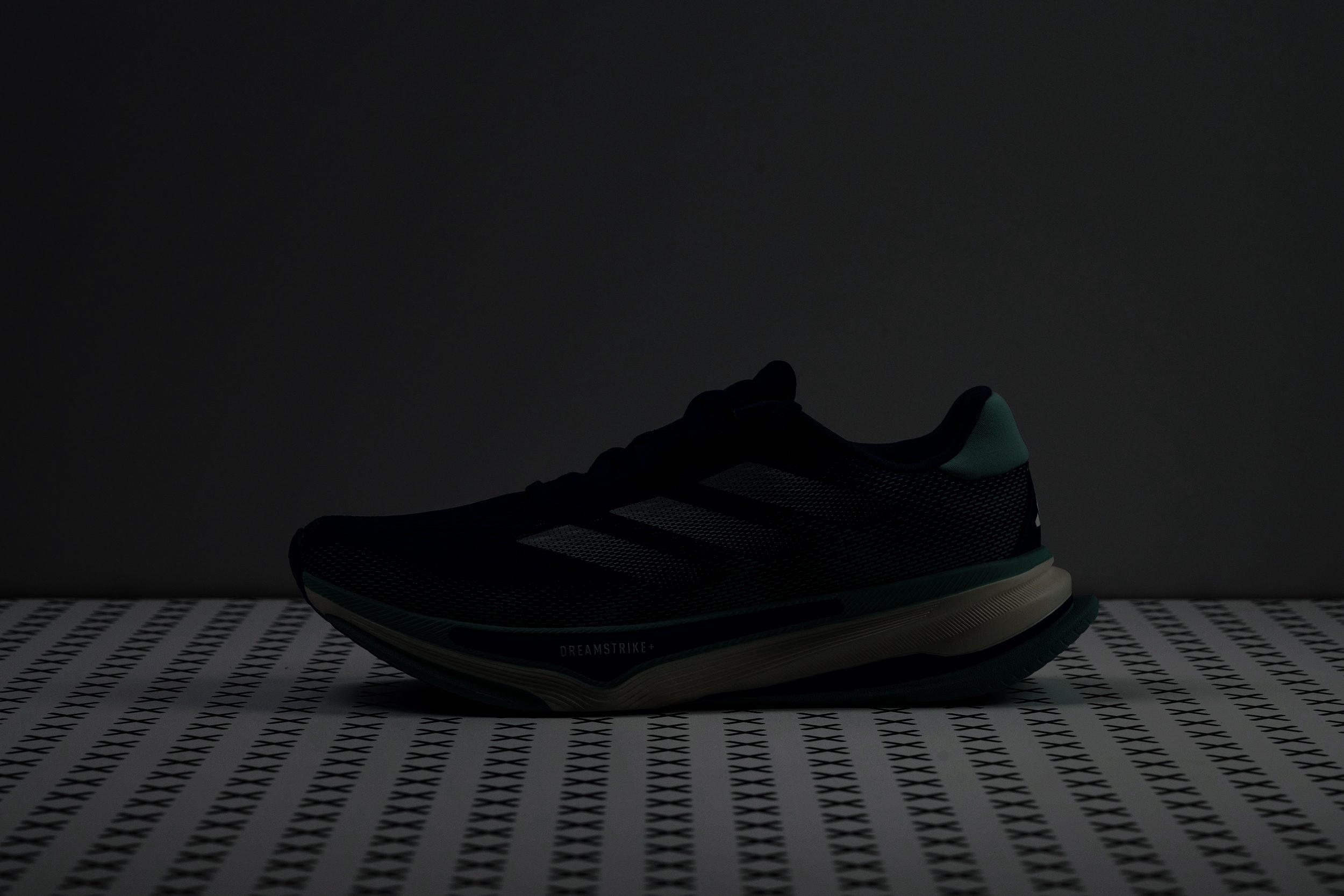
| Supernova Prima | No |
Tongue padding
We appreciated the updated tongue, which significantly improves on the one found in the Adidas Supernova 3, as it felt bulky and overly thick. The Prima’s tongue, redesigned with a balanced 7.7 mm of padding, offers comfort exactly where it counts most.
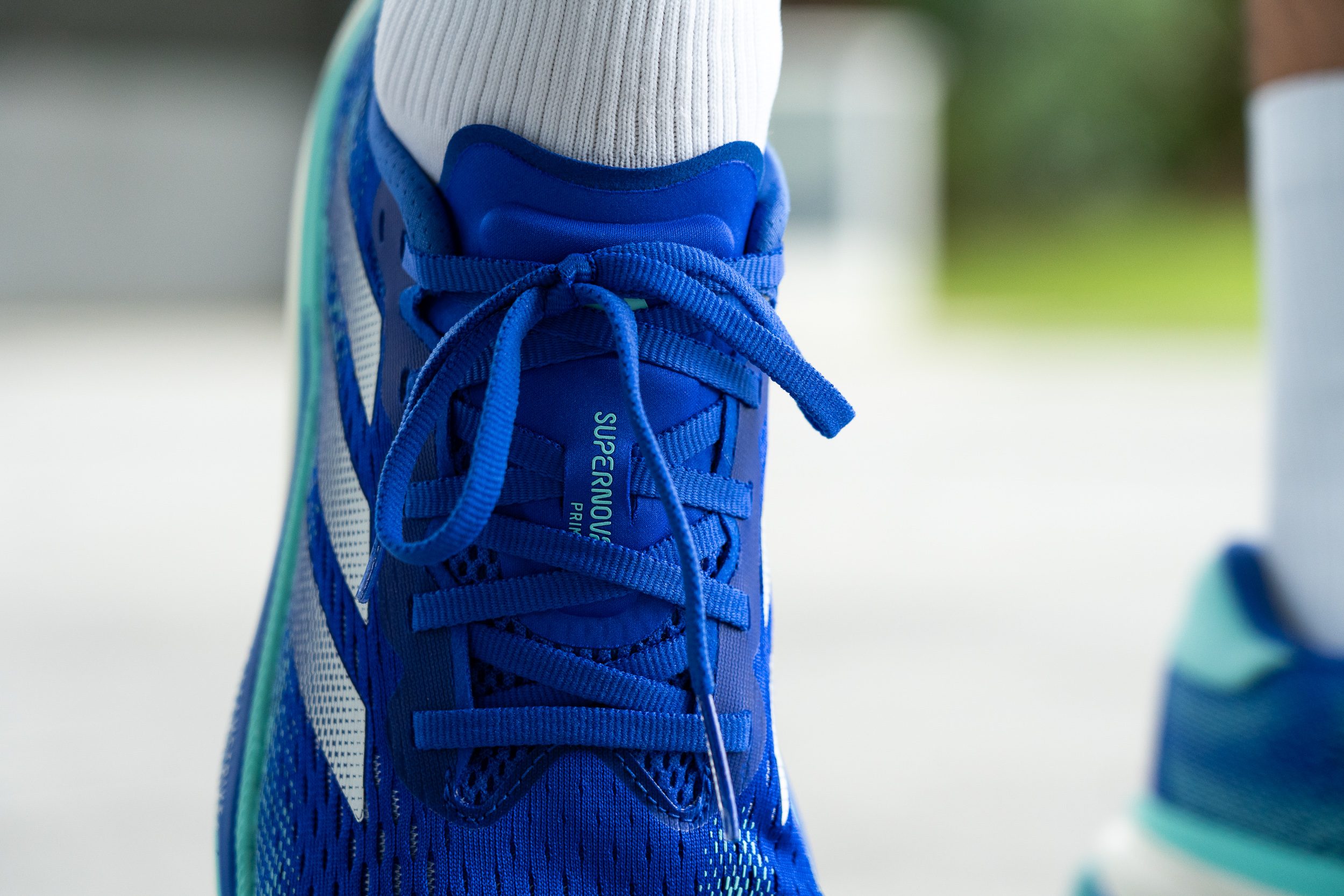
We also enjoyed Adidas’ streamlined approach to the lacing system, following the KISS (Keep It Simple, Stup*d) method that we love. Flat laces, punched eyelets, and the often-overlooked extra hole provide ample flexibility for various lacing techniques.
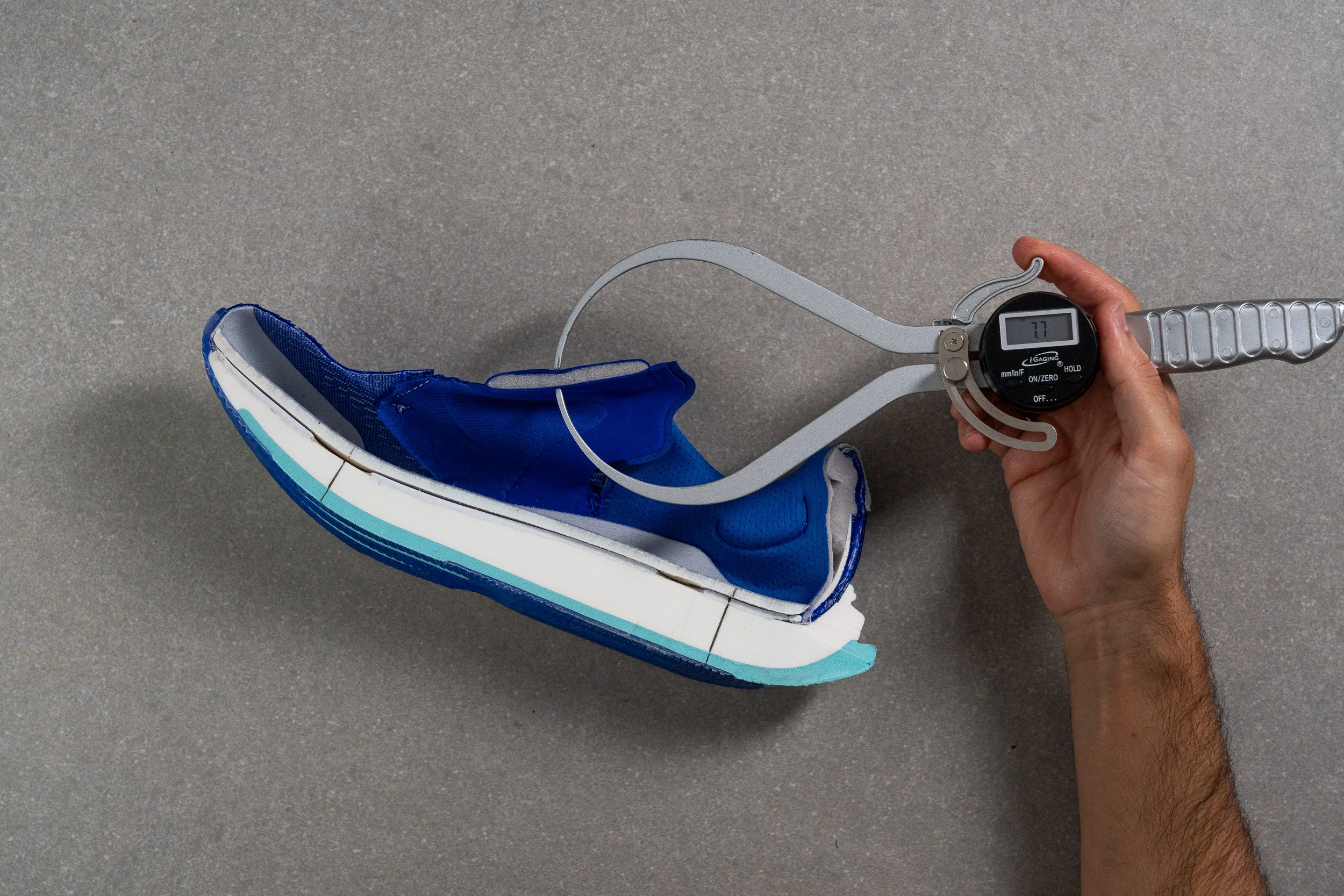
| Supernova Prima | 7.7 mm |
| Average | 5.7 mm |
Tongue: gusset type
In our experience, one of the biggest disappointments is finding a premium daily trainer with a non-gusseted tongue. Fortunately, this Adidas model left us pleased—we discovered a semi-gusseted tongue that kept perfectly in place!

| Supernova Prima | Both sides (semi) |
Heel tab
After testing several hundreds of shoes, we found that Adidas is among the brands that really try to avoid finger-loop heel tabs, so we weren’t surprised to find none on the Supernova Prima.
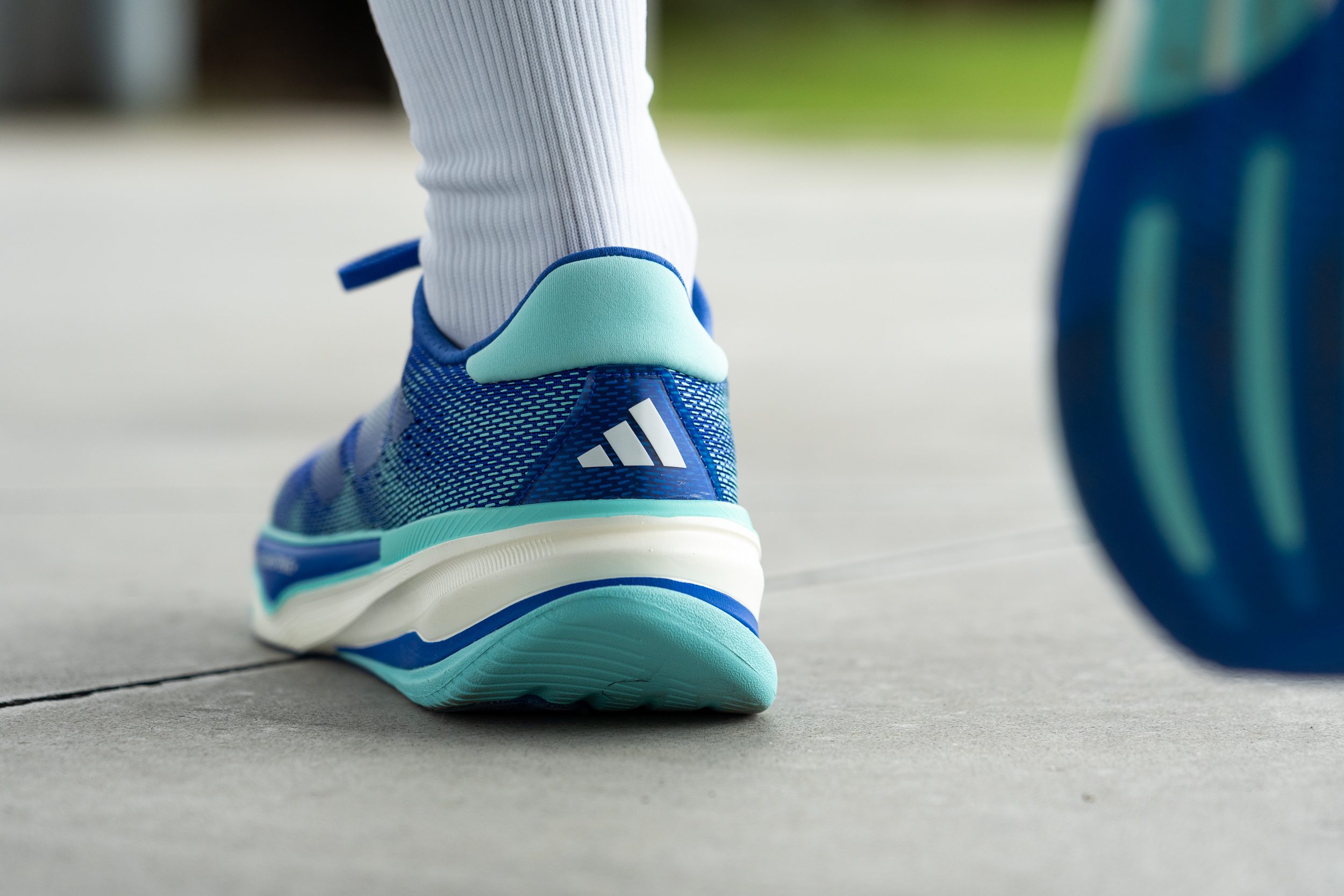
| Supernova Prima | None |
Price
The Prima stands as Adidas' premium trainer within the Supernova lineup, and we believe it’s competitively priced for everything it offers. In our view, it strikes a good balance between quality and value when compared to similar models on the market.
| Supernova Prima | $160 |
| Average | $153 |

